THE 5th ANNUAL BFED!


SEE PAGE 8

THE 5th ANNUAL BFED!


SEE PAGE 8

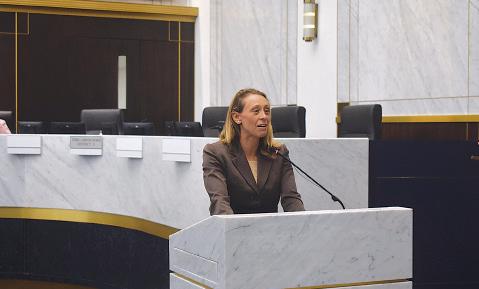 By Macy Meinhardt
VOICE AND VIEWPOINT STAFF WRITER
By Macy Meinhardt
VOICE AND VIEWPOINT STAFF WRITER
Experts, legislators, and community advocates for gun violence control took to the podium on Friday to discuss ways in which San Diego can come together to curb gun violence.
The summit held four speaker panels with a targeted focus on suicide prevention, protecting children, community driven peace work, and holding firearm industries accountable. Elected representatives, including members of
California Attorney General Rob Bonta, mental health experts and stewards from organizations such Open Heart Leaders spoke on the panels.
Data conducted by the county over a five year span reveals the need for solution driven discussions of this kind. 1,310 lives have been lost to related firearm deaths between 2017-2022. In this time period, firearm suicides are found to be the leading cause of death at 71 percent, whereas firearm homicide rates have increased by 56 percent.
See SOLUTIONS page 2
By Stacy M. Brown NNPA NEWSWIRE SR NATIONAL CORRESPONDENT
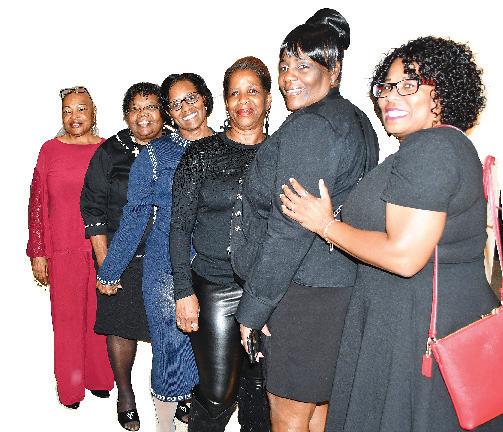


As discussions surrounding fair and informed journalism continue, it remains clear that many Black Americans are eager to see changes in news coverage that accurately reflect their experiences and perspectives. That perspective became more pronounced with the release of a new report by the Pew Research Center, which sheds light on the perceptions of Black Americans regarding news coverage that often portrays them negatively compared to other racial and ethnic groups.
Based on a comprehensive survey of 4,742 U.S. Black adults conducted from February 22 to March 5, 2023, along with nine online focus groups held between July and August 2022, African Americans have expressed a growing desire for fair and informed reporting.

The key findings of the multi-method report provide a nuanced understanding of Black Americans’ views on news coverage include:
1. Perceptions of Coverage: The report reveals that 63% of Black Americans believe that news coverage about Black people tends to be more negative than that of other racial and ethnic groups. Additionally, more than half of Black adults (57%) feel that news about Black people only covers certain segments of their communities, while 50% think it often lacks essential information. Only 9% believe that the news adequately covers a diverse range of Black experiences and consistently provides the whole story. Worryingly, just 14% of Black Americans are optimistic that fair coverage of Black people will become a reality in their lifetimes, with 38% believing it is unlikely to happen.
See NEWS page 2
 By Antonio Ray Harvey CALIFORNIA BLACK MEDIA
By Antonio Ray Harvey CALIFORNIA BLACK MEDIA
Gov. Gavin Newsom has announced that his choice to succeed U.S. Sen. Dianne Feinstein, who passed away on Sept. 29, is Laphonza Butler, a labor leader and the president of EMILY’s List — the country’s most extensive resource for women in politics.





School leaders, students, and supporters of the late George Walker Smith gathered Wednesday to celebrate the opening of an education campus named in his honor.
Known throughout the San Diego community as an esteemed leader in the fields of civics, religion, and education, the campus now houses Central Elementary School and Wilson Middle School under his name and legacy.
“As we mourn the enormous loss of Senator Feinstein, the very freedoms she fought for — reproductive freedom, equal protection, and safety from gun violence — have never been under greater assault. Laphonza will carry the baton left by Senator Feinstein, continue to break glass ceilings, and fight for all Californians in Washington D.C.,” said Newsom in a statement released Oct. 1.
See BUTLER page 2
“Wilson Middle and Central Middle started with a dream. Someone had a dream for our City Heights community. And today we are all here to celebrate not only the idea behind the dream, but that that dream has actually come true today,” said Central Elementary Principal, Angelica Hueso-Garcia.

As the first African-American elected to office in San Diego back in 1963, Reverend Smith served on the San Diego Unified School Board for over sixteen years, with four terms as president. His tenure in public service played an instrumental role in increasing the diversity of the district's teaching staff, and he displayed an unwavering commitment to ensuring equal educational opportunities for every student. Further expanding his scope of influence,
See SMITH page 6

Continued from cover
2. Steps for Improvement: A significant majority of Black Americans, 76%, emphasize the importance of journalists covering all sides of an issue when reporting on Black people, while 73% stress the necessity of understanding the historical context behind the stories. Roughly half (48%) also call for journalists to advocate for Black people when covering them. Furthermore, 64% of those who have encountered racially insensitive coverage believe that educating all journalists about issues affecting Black Americans would be highly effective in achieving fairer news coverage. A substantial proportion also supports the inclusion of more Black voices as sources (54%), the hiring of more Black individuals as newsroom leaders (53%), and journalists (44%).
3. Newsroom Representation: Many Black Americans believe that Black journalists play
a crucial role in reporting race and racial inequality news. Approximately 45% feel that Black journalists excel at covering these issues, with 44% stating that Black journalists better understand them. However, few Black Americans consider the journalist’s race as a key factor in the credibility of a news story, with just 14% believing it is vital for news to come from Black journalists, regardless of the topic.
4. Concerns Across the Black Population: Concerns about negative news coverage are widespread among Black Americans, transcending political affiliations. Both Black Republicans and Black Democrats (including leaners) express similar concerns, with 46% of Republicans and 44% of Democrats agreeing that coverage often stereotypes Black people. This starkly contrasts with the 11% in both groups who believe it does not. Additionally, Black Americans with higher education and income levels tend to hold more negative views regarding the media’s coverage of Black people.
5. The Role of Black Identity: The study reveals that Black Americans’ perceptions of news coverage vary significantly based on their identity. The vast majority (82%) of those who consider being Black highly important to their identity emphasize the importance of journalists understanding the historical context of stories. This number decreases to 55% among those who place less importance on their Black identity.
6. Sources of News and Information: The report also delves into news sources for Black Americans. At least a third of Black Americans report getting news from local news outlets, national news outlets, social media sites, and friends, family, and acquaintances. Notably, 24% state that they often receive news from Black news outlets, with an additional 40% occasionally turning to them.
The margin of sampling error for the survey’s total sample of 4,742 respondents is plus or minus 2.1 percentage points.
“In 1967, the Kerner Commission — undertaken by President Lyndon Johnson’s administration to investigate the causes behind urban riots — took a harsh view on the news media’s stance toward Black Americans,” the report’s researchers wrote. “The commission’s report cited sensationalist and divisive coverage as well as inaccurate and unfair representations of Black communities, concluding that ‘the journalistic profession has been shockingly backward in seeking out, hiring and promoting’ Black people, and ‘the press has too long basked in a white world looking out of it, if at all, with white men’s eyes and white perspective.’”
The researchers continued: “More than half a century later, there is continued discussion of many of the themes raised in the report. This new study asks Black Americans themselves about their experience with news today, including views around portrayals of Black people in news stories, representation in newsrooms, and where they go and whom they trust for information.”
Furthermore, the firearm homicide rate for Black residents in the county is almost ten times greater than for White residents.
“These results point to the conclusion that everyone has a role to play in the prevention of gun violence; that addressing systemic and historic inequities is central to addressing gun violence; and that prevention and intervention strategies should be tailored to specific populations,” the report states.
Cities with the leading firearm homicide rate in the county are Lemon Grove, National City, and Vista. Lemon Grove is also reported to lead with the highest firearm related suicide, followed by El Cajon, and La Mesa.
On the topic of community outreach and effectiveness, April Laster, Co-founder and Executive Director of Open Heart Leaders, spoke on the importance of diversifying communication tactics on gun violence to communities of color.
Referencing that communication from higher levels of government often gets lost in translation, Laster remarks that “we are spinning our wheels in circles by listening to people who have never stepped foot in the neighborhoods, that are ultimately affected by gun violence, make decisions on how we should address gun violence,” said Laster.
“We have to advocate for more comprehensive gun safety measures. And advocating for that means supporting research, getting accurate data from all different demographic angles of the world,” said Laster.
Meanwhile, President Pro Tem Monica Montgomery Steppe also spoke at the panel, discussing her commitment to investing in community based volunteer organizations, policy solutions, and prevention programs as a city leader.
“When we recognize public safety as a system of interconnected pieces interacting with one another, we highlight those moving pieces
Continued from cover Butler
Continued from cover
Butler will make history as California’s first openly LGBTQ+ U.S. Senator and the first Black lesbian to openly serve in the U.S. Congress. She will join 47 other Democrats and three independents who caucus with the Democrats in the Senate for the remainder of Feinstein’s term, which ends in December 2024.
“An advocate for women and girls, a secondgeneration fighter for working people, and a trusted adviser to Vice President Harris, Laphonza Butler represents the best of California, and she’ll represent us proudly in the United States Senate,” Newsom stated.
Assemblymember Mike Gipson (D-Carson), a member of the California Legislative Black Caucus (CLBC), says he is proud of Newsom’s choice.
“As a proud member of @CABlackCaucus and Assemblymember for #AD65, I am extremely proud that @GavinNewsom stood by his commitment as he always has,” Gipson wrote on X, the social media platform formerly known as Twitter. “And I appreciate him for standing by his word and providing a great successor amidst the passing of the honorable Senator Feinstein,”
of the structure that keep our communities safe and thriving. We need proactive measures, along with a lot of the reactive measures that law enforcement provides,” said Councilmember Montgomery Steppe.
Bishop Cornelius Bowser, Councilmember Pro Tem Monica Montgomery Steppe, and
One of the San Diego based volunteer organizations, Councilmember Montgomery Steppe highlighted included the Community Assistance Support Team also known as CAST.
“Having this type of street outreach with trusted credible messengers and violence interrupters makes an actual difference with community members and builds bridges of trust between community and law enforcement,” said Councilmember Montgomery Steppe.
Bishop Cornelius Bowser, who co-founded CAST in 2012, also spoke on the panel, discussing their community driven work specifically targeted at gang violence.
In regards to challenges faced by organizers of community violence intervention programs, lack of resources to sustain organization capacity is the main one.
“The challenges just within the system, although this work is not foreign to the community, the advocacy within institutionalizing these programs and making them not just pro-
grams, but a part of the overall system is foreign to our government structure overall,” said President Pro Tem Montgomery Steppe. Despite the current challenges, the panel also featured city leaders who shared successful program implementations. One of these includes the Gun Violence Restraining Orders–also known as GRVOS–trail blazed by City Attorney, Mara Elliott.
A GRVO is a civil restraining order that removes firearms from individuals who pose a threat to themselves or others. Since implementation in 2017, the City Attorney reports that it has intervened in over a thousand cases throughout the region, and serves as an exemplary life saving tool for many law enforcement agencies across the state.

“When you start a new program like this one and you're threatened with federal laws, people on social media not liking the direction that you're going in, it's very easy to buckle at the knees,” the City Attorney explained.
However, “that is not San Diego and we did not do that,” said Elliott.
At the end of the summit, Supervisor LawsonRemer called for the county to unite in support of Governor Newsom’s 28th amendment proposal to confront gun violence directly and safeguard the community.
Key components of the proposal include banning the sale of assault weapons, instituting a waiting period for all firearm purchases, raising the age to purchase a firearm from eighteen to twenty one, and mandating universal background checks.
“We must keep fighting, we must keep organizing, we must do better,” said Supervisor Terra Lawson-Remer.
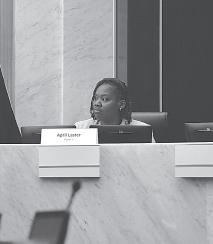
Despite the ongoing work needed to reduce firearm-related violence in San Diego, last Friday’s summit discussions underscore the commitment to making firearm advocacy programs an integral part of local government agendas, moving them from an unfamiliar concept to a vital one.
“I am always excited when a Black Woman is elevated. Laphonza Butler will represent California well and will bring a perspective to the US Senate that is desperately needed as a Black, LGBTQ+, mother, organizer, and labor leader,” said Kellie Todd Griffin, founding convener of the California Black Women's Collective.
“My goal is to lift up the voices and needs of Black Women throughout the state,” continued Todd Griffin. “That's what we did three years ago when we created Keep the Seat and what we did in this case. We will keep pushing for what we believe is right regardless of the outcomes.”
Butler, recognized as a Democratic Strategist and a labor leader, served for seven years as President of SEIU United Long Term Care Workers (ULTCW). The union she led represents over 325,000 nursing home and homecare workers across California.
Newsom, who has the constitutional responsibility to appoint a replacement, promised he would select a Black woman if Feinstein chose to step down before her term ended in 2024. He made that statement in 2021 after he chose Alex Padilla to fill the vacancy left by Sen. Kamala Harris when she resigned to become vice president. Black women groups had been urging him to appoint a Black woman to succeed Harris.
Until Butler is seated, the U.S. Senate has no Black women members even though Black women are the most influential – and most loyal – voting group within the Democratic party. More than 90 % of Black women voted for Joe Biden in the last presidential election.
Before Newsom’s announcement that he had chosen her to succeed Feinstein, Butler expressed her condolences on X. She wrote, “I'm saddened to hear of the passing of Sen. @DianneFeinstein. Not only was she a titan in the Senate, but a legendary figure for women in politics and around the country. Her legacy and achievements will not be forgotten. My prayers are with her family. She will be deeply missed.”
Since Feinstein’s passing was announced, pressure had been mounting on Newsom to quickly appoint an interim Senator in her place. Three well known candidates running to succeed her in the 2024 election are Rep. Barbara Lee (D-CA-12), Rep. Adam B. Schiff (D-CA-28) and Rep. Katie Porter (D – CA-45).
Lee, the only Black woman contending for Feinstein’s seat, congratulated Butler in a post on X.
“I wish Laphonza well and look forward to working closely with her to deliver for the people of the Golden State,” she wrote.
On Oct.1, the Congressional Black Caucus (CBC) wrote a letter to Newsom urging him to appoint Lee.
“She is the only person with the courage, the vision, and the record to eradicate poverty, face down the fossil fuel industry, defend our democracy, and tirelessly advance the progressive agenda,” CBC Chairman Steven Horsford (D-Nevada), stated in the letter to Newsom. “For these reasons, we strongly urge you to appoint Congresswoman Barbara Lee to the United States Senate.”
Newsom had expressed that his appointee would not participate in the 2024 election out of respect for the candidates already running. However, this stance has changed. Now the decision to run in the 2024 election lies with Butler. The deadline for candidates to file for the office is Dec. 8.
Butler, a native of Magnolia, Mississippi, earned a Bachelor of Arts degree in Political Science from Jackson State University, an HBCU located in Mississippi.
“I'm honored to accept Gov. @GavinNewsom’s nomination to be U.S. Senator for a state I have made my home and honored by his trust in me to serve the people of California and this great nation,” Butler posted on X.
Neighborhood Innovations will have as its theme, a focus on “The Politics of Hate” (and stopping the hate). This meeting will not only feature San Diego County District Attorney, Summer Stephen, but also members of San Diego’s ethnic communities speaking on the politics of hate impacting their communities.
This is a great followup discussion opportunity following the recent indictment of 17 members of the Hells Angels motorcycle gang who racially and brutally attacked three African American males in Ocean Beach in June of this year. Law enforcement is now more aggressively looking at this issue and documenting like never before. Much of this is due to the serious commitment District Attorney Summer Stephen has made to stop hate and share awareness of the problem.
While the Black community has the highest number of hate crimes incidents in the state, the occasions of hateful conduct extends to other ethnic groups as well as the LGBTQ+ communities.
As voters express anxiety over President Biden’s handling of the economy, the Congressional Black Caucus (CBC) gathered in Washington [the last week in September] to discuss an agenda for the 2024 election. What follows are some observations on the topics of concern, and on how the CBC can do more to promote structures of economic empowerment.
To its credit, the conference featured panels that shifted the focus away from non-economic demands, a notable departure from the agenda promoted by civil rights leaders over the summer — the NAACP convention in July, with a primary message on voting rights, and the March on Washington in August “against hate and for civil rights.” By contrast, the CBC conference took steps to shape an economic message for different levels of concern. An economic message is urgent, in light of the longstanding barriers to prosperity for many Black Americans.
As many of us know, hate crimes are against the law and have been so for many years. The problem is that until the recent uptick in such crimes, many went unreported or undocumented. Here in San Diego, this newspaper has been reporting on “stop the hate” since the early 1980s. In the last two years, we have done a number of Town Hall meetings in person and online with the County District Attorney on hate crimes in San Diego County, the most recent, a zoom meeting with the District Attorney just a couple of months ago.
On Tuesday, October 17th, the next Biscuits, Grits & Politics Breakfast meeting at the Jacob’s Center for
The Politics of Hate discussions represent a major step toward finding solutions and a real campaign to Stop The Hate. Your participation, from all elements of the San Diego community, is important and necessary before you become a victim of such crimes or activities which can take a variety of forms in speech and actions.
Please plan to join us at Biscuits, Grits & Politics on October 17th for the Politics of Hate. Tickets are available on Eventbrite or come to our office to purchase. Please call or email your thoughts and comments as we work on this important topic.
By Dr. John E. WarrenIf we missed it, then our profound apologies. The question remains, How do we talk about Economic Justice for Blacks and not mention the Black Press? In the Economic Justice Agenda for 2024, the CBC calls for inclusive hiring and contracting under the federal infrastructure projects like The Inflation Reduction Act and the $1.2 trillion Infrastructure Investment and Jobs Acts. The discussion indicated that the CBC wants to guarantee the hiring of Black workers among the thousands of construction industry jobs that will be available. The significance of this position is based on the historical exclusion of such Black and Hispanic workers according to the Bureau of Labor Statistics reporting the racial demographics in the construction industry at 60% white, 30% Hispanic, AND ONLY 5% Black Americans.
Once again, for some of us, the disconnect is the omission of the Black Press as an instrument of outreach which just happens to be required by law in most states. Here is how the dots connect: Federal dollars used to bid construction contracts must be put out in bids to do the desired work. Those bids are required to give notice under the Administrative Procedures Act found under Title 5 of the U.S. Code, sec. 553, 554, 555, for starters. The idea is that federal dollars come from taxpayers and we
are entitled to know how they are spent.
The CBC could help this process and take a step toward achieving its stated goal by encouraging the President to do an Executive Order requiring that all bid contracts for the trillions of dollars under these two acts alone, be advertised in local newspapers of general circulation.
The following are two specific reasons: One, all of America is not on the internet, so many are excluded from notice of such bids carrying dollars and job opportunities for the very people who are left out; Two, such an Executive Order not only reaches Main Street, but the neighborhoods surrounding Main Street and truly delivers job opportunities which helps the local community papers remain “trusted messengers” at a time of fake news and diminishing newspapers.
Such an effort, bringing our 2000 plus community newspapers into the process, would also include our 200 plus local Black newspapers and help all our communities.
The Congressional Black Caucus must become a more visible supporter of the Black Press, which has supported and reported on the Caucus since its inception and at times when no one else did. This is not a criticism, but a plan of action that can be implemented with a stroke of the President’s pen, if we ask and pursue.

The

Foremost, leaders will defend companies that carry out practices of diversity, equity and inclusion (DEI). Corporations with strong DEI policies will earn CBC support as a counterweight to right-wing attempts to demonize racial justice. Joining in the discussion was Sean “P. Diddy” Combs, the rapper, record producer and television executive. He exhorted the audience to be proactive in the pursuit of an effective economic agenda, saying: “A lot of us are living the illusion of inclusion — but true diversity is about sharing power.”
The CBC will demand inclusive hiring and contracting under the federal infrastructure projects.
The Inflation Reduction Act and the $1.2 trillion Infrastructure Investment and Jobs Act will invest vast sums in electric battery plants, electric vehicle factories, electric charging stations, the weatherization of public buildings, and the reconstruction of highways, bridges and tunnels — projects that will require hiring and training thousands of skilled workers.
The CBC wants to guarantee inclusionary practices in a construction industry that historically has excluded Black workers. According to the Bureau of Labor Statistics, the racial demographic in the construction industry is 60% white, 30% Hispanic, and 5% Black American.
To justify demands for priority Black recruitment and contracting, [Mayor Wayne Messam of Miramar, Florida] suggested using studies of construction industry racial disparities and identifying underserved communities by zip code for outreach priorities. Tonya Hicks, founder of Power Solutions Inc. One way is to limit the scale of projects to packages manageable by subcontractors. Another is to reduce the requirement for bond and insurance liability for simple projects.
Rep. Gregory Meeks (D-N.Y.) advocated for inclusion in investment opportunities, suggesting a requirement of 30% equity stakes by Black-owned investment funds in commercial development projects that use infrastructure funding.
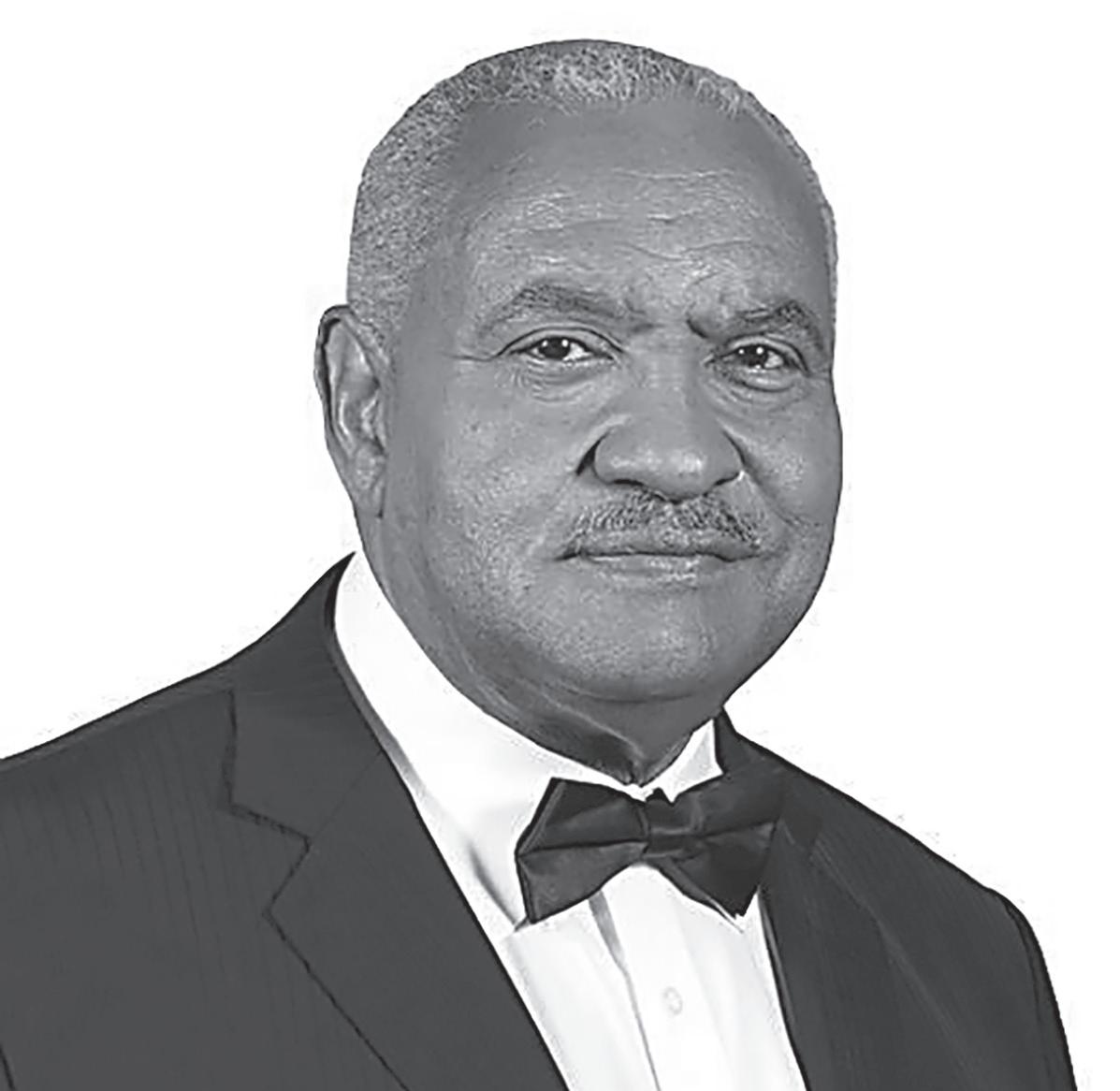
The CBC can do more to encourage thinking about the formation of internal structures for development. First, for instance, it was silent on the potential benefits of forging cooperative strategies among organizations such as Historically Black Colleges and Universities, churches, professional associations, and the self-employed.

Second, it neglected the feasibility of strategic migration to four Southern states of political and economic promise: Maryland, Virginia, North Carolina, and Georgia. This strategy aims to recruit middle-class people in politically repugnant states like Texas, Florida, and the Mississippi Delta region to relocate to moderate states. The project is to support the future expansion of Black political and economic influence in multiple states.
See CBC page 15
YOU
Search: Pastor John E. Warren San Diego







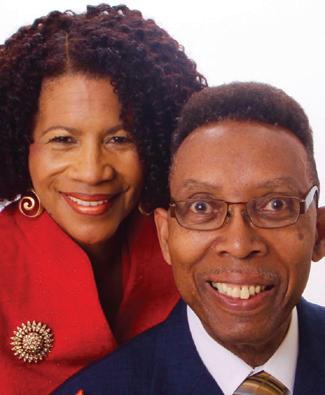
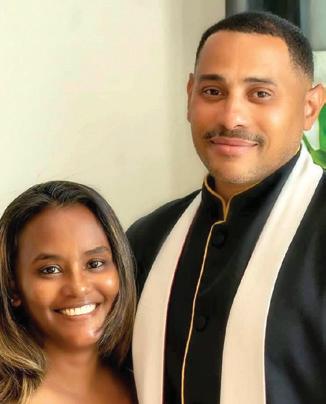
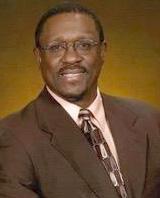

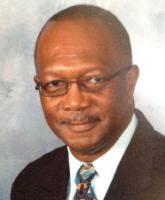



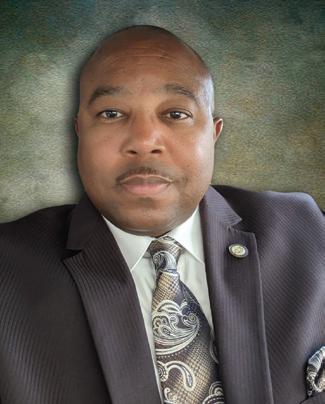
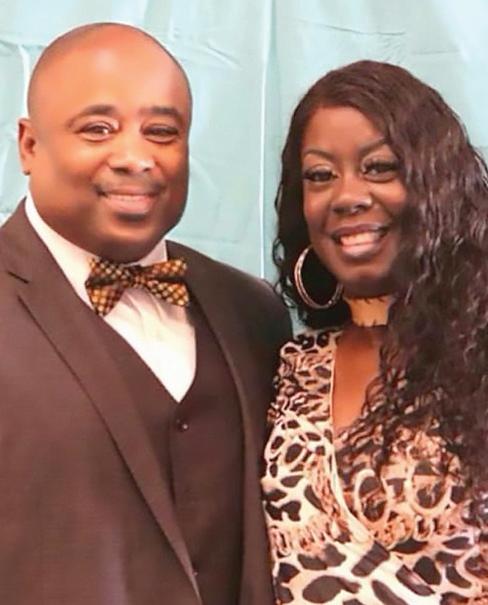
We are a non-denominational full fellowship of believers dedicated to reach our community with the gospel and providing a place for believers to workship, learn, fellowship, serve and grow into the fullness of Christ Jesus. This ministry is to build people of Purpose, Prayer, Power, Praise and Prosperity. This mandate is being fulfilled by reaching the reality of the gospel in a simplistic fashion, and a result, learning how to apply it in everyday life.

Louis Parker Wright was born on June 30, 1947, to Annebell Brown Wright and Joseph Wright in Charleston, South Carolina.
After graduating from Haut Gap High School in 1967, he enlisted in the United States Navy as an AD, Aviation Mechanic, during the Vietnam War. In 1971, after completing a term in the Armed Forces, he pursued a career in the field of Carpentry, joining the Carpenters Southwest Administrative Corporation as a carpenter, kickstarting a fifty year long career in the field.

In 1972, Louis met Ida Wright in San Diego, California, and went on to have four children. In 2020, Louis retired with his lifelong friend Leslie Combs.
Louis enjoyed spending his time gardening, fishing, laughing, and enjoying his neighbors. His kind heart, giving spirit, and incredible work ethic will forever be missed but never forgotten. On September 17, 2023, Louis Parker Wright passed away at the age of 76, due to natural causes.
Louis was preceded in death by his parents, Thomasina WrightGrant, Dorothy Worrell Wright, Thomasina Blake Wright, Jonnie Samson Wright, Hogan Charles Wright, and Lulu Bell Wright.

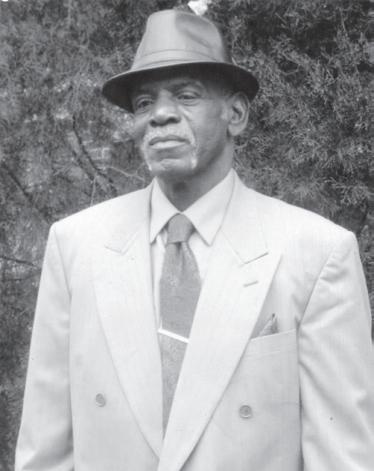
Left to treasure his memory is his brother Robert Lee Wright (Rashana Wright), his children; Treva Wright-Watson, Randall, Natalie Wright-Sparks, Taron, and Caroline Wright, two son in-laws and daughter in-law; Curley J. Sparks III and Gerald Randall, and fifteen grandchildren; Maalik Watson, Julie Watson, Najwa Watson, Imani Watson-Dews, Harry Dews, Qadira Watson, Zenobia Watson, Ah'liyah Sparks, Jade Sparks, Curley J. Sparks IV, James Sparks, Jazlyn Wright, Nevaeh Wright, Louis Austin Wright, and Naomi Wright.
I finished as a Greene, but born a Whiteside... I, Lashenia Teresa Greene, made my debut on January 21, 1974, in Gary, Indiana. Born to parents Zadie L. Word and Romie Whiteside, Sr., I spent most of my childhood in Bellwood, Illinois, until I relocated to Chicago, Illinois, where I graduated from Foreman High School. I was a member of ROTC and enlisted into the United States Navy, where I served six years as a Hospital Corpsman at the Naval Medical Center in San Diego, California.
I married Reginald Alan Greene, and of our union, I birthed two beautiful daughters, Alexus and Kayla. Later, I graduated from The University of Phoenix with a BS in Business Administration on September 30, 2009.
In June 1994, I became a member at North Park Apostolic Church, being saved that same year. In 1995, I joined Golden Hills Triple A Ministries under the tutelage of Bishop Dr. Loretta A. Gonzales, and I became ordained in 2002.
In 2006, my husband and I founded Solid Rock Worship Center, and I was ordained an Evangelist under Senior Pastor Russell Bowman of Righteous Living Ministries in El Cajon, CA.
In 2021, I became a partner at Greater Life Church, under Pastor Nate Stewart. I served as the ministry leader of the Altar Workers.
In 2020, I launched KBG Kreations which stands for Kreate, Build, and Grind, where we specialize in a new way of expressing kreations through clothing.
During my 49 years of life, I experienced some joy, lots of laughter, true love, great sacrifices, and even some pain. With all that God has favored me to do and all the achievements I’ve made, nothing compares to the day I was able to lay it ALL down at his feet. On September 20, 2023, I received my final and eternal reward! I know 49 years may seem young to some of you, but chile, I was tired!!
I’ve been preceded in death by my biological father Romie Whiteside, Sr. and my adoptive parents, Leodis and Lillian Carr. I leave to cherish my memory grandmother Hazel Richardson, mother Zadie L. Word, siblings; Romie Whiteside III (Temika), Samuel Holloway III, Anthony Whiteside, Joi Whiteside, Tracy Johnson, Brandy Whiteside, and Tia Whiteside, and children in love, Demetrius and Jasmine Greene.
I leave to cherish my legacy husband Reggie, daughters; Alexus and Kayla, and a host of aunts, uncles, nieces, nephews, family, and friends.
SUNRISE 12/20/1952
SUNSET 09/17/2023
Glory D. Thornton entered this world on December 20th, 1952, to Savannah & Jammie Lee Roots in San Diego, California. Glory attended Emerson Elementary, Memorial Jr. High, and graduated from Abraham Lincoln High School in 1971. Glory ran track for Mickey’s Missiles under the leadership of the late Audrey Tyler. She could run amazingly fast to beat that 10:30 curfew.
On February 18th, 1972, Glory was blessed with the birth of her daughter Sherhonda, her only child. You can see from their pictures how much she loved and adored her. Other happy moments were the births of her grandchildren and great-grandchild.
Glory worked at various jobs including the Post Office, Bandini Elementary, and she volunteered at Logan Elementary doing various tasks.
Glory had 2 previous marriages, formerly Kuykendal and Thornton.
Glory joined Mt. Nebo Baptist Church in 1997 and was a faithful servant of God under Rev. Anthony Howard.
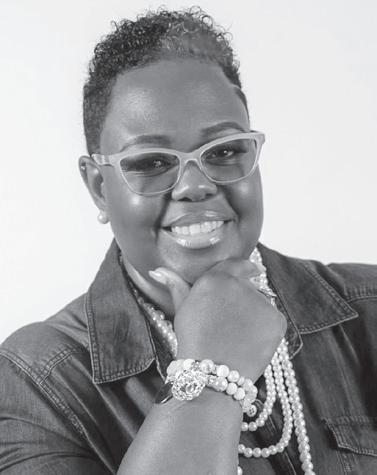
God called Glory home on September 17th, 2023. Preceding her in death was Savannah Roots (Mother), Jamie Lee Roots, Sr. (Father), Jamie Lee Roots, Jr. (Brother), Keishauna & Deanna (GrandDaughters), her grandparents, aunts, and uncles.
Glory Leaves to cherish her memory daughter Sherhonda Moreau (San Diego), two grandsons; Jamare & Evion Moreau (San Diego), granddaughter Terranai McCrary (San Diego), one great-grandson Cayden Moreau (San Diego), brothers; Jimmy Roots (Las Vegas), Elton Anderson (San Diego), Ramon Roots (Los Angeles), and Bruce Jelks (Los Angeles), sisters; Lorraine Johnson, Florenda Thompson, Modesta Roots, Rosalind Washington, Rhonda Goode, and Lisa Rojas, All of San Diego, CA, and a host of nieces, nephews, cousins & more.
SUNRISE 02/16/1944

SUNSET 08/26/2023




We are sad to announce the passing of Dr. Andrew Lee (Woody) Woodridge, Sr. of San Diego, CA. He was born on February 16, 1944. He died at age of 79 on August 26, 2023. Woody passed away surrounded by his loved ones after a battle with cancer. He is survived by beloved ex wife Mary Elizabeth, children, grandchildren and great grandchild; Andrea, Andrew, Corrin, Janae, Tristan, Nicolas, and Jordyn. A funeral service will be held in his honor at 11:00am PST on October 20th, 2023, at California Cremation & Burial Chapel, 2200 Highland Avenue, National City, CA 91950.
Lee Manuel Bradley, Sr. was the sixth child, born on February 2, 1939, to Geneva Porter Bradley and Isaac Frank Bradley, Sr. in Sawdust, Florida. Lee, as he was affectionately called, attended the public schools of Leon County in Tallahassee, Florida. He graduated from Old Lincoln High School in 1957, where he played football and was elected Senior Class President.
Lee enlisted in the United States Marine Corps in June of 1957. During Lee's illustrious thirty year career, he rose in rank to Sergeant Major in 1973. He was a Drill Instructor and also Platoon Sergeant for the Silent Drill Team, receiving numerous recognitions and medals. Lee was honorably discharged in July of 1987 at Camp Pendleton in Oceanside, CA.
After retiring from the USMC, Lee put his recollective childhood cobbler skills to use. He opened and operated two successful shoe repair businesses in San Diego. He retired as the owner of Lee's Shoe and Boot Repair in June of 2018.
Lee was joined in holy matrimony to Emma Jane Rush on March 7, 1960. To this union, seven children were born. Lee and Emma enjoyed sixty-three years of marital bliss.
Lee was a faithful and lifelong member of his home based church, Flipper Chapel AME Church in Tallahassee, Florida. Once he established roots in San Diego in the 1980's, he joined Bethel AME Church.
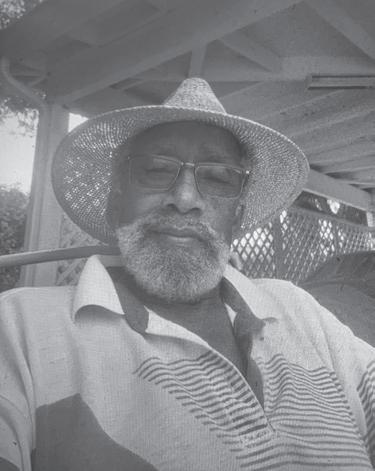
Lee was a kind and humble man who loved his family and was always willing to help others in their time of need. Lee loved barbecues and family dinners. His favorite holiday was Thanksgiving. On August 29, 2023, he entered into his eternal home.
Lee was preceded in death by son Kelvin Bradley, Sr. and grandson Timothy Bradley, Jr.
Cherishing his memories are: his wife of 63 years, Emma R. Bradley, three sons; Timothy Bradley, Sr. of Jacksonville, NC, Lee M. Bradley, Jr. (Deborah) of Spring Valley, CA, and Len M. Bradley (LaJuana) of Chula Vista, CA, four daughters; Geneva Bradley-Palmore (Michael) of San Marcos, CA, Karen Bradley of San Diego, CA, Tracie Bradley of Spring Valley, CA, and his very special child Monique Bradley of San Diego, CA, one brother; Nathaniel Bradley, Sr. (Constance) of Aurora, CO, one sister; Ruth B. Armstrong of Tallahassee, FL, four sisters-in-laws, two daughters-in-laws, ten grandchildren, ten great-grandchildren, four great-great-grandchildren, along with many nieces, nephews, cousins, and other relatives, the USMC brotherhood, and friends.
T he Lord is close to the brokenhearted and saves those who are crushed in spirit.
Psalm 34:18






in 1976 he was elected President of the National School Board Association.

“The great Reverend dedicated his life towards fighting against discrimination, fighting for inclusion, and fighting for equity. This [the campus] represents part of that dream of bringing people of all walks of life into one complex in the City Heights community,” said Superintendent of San Diego Unified, Dr. Lamont Jackson.
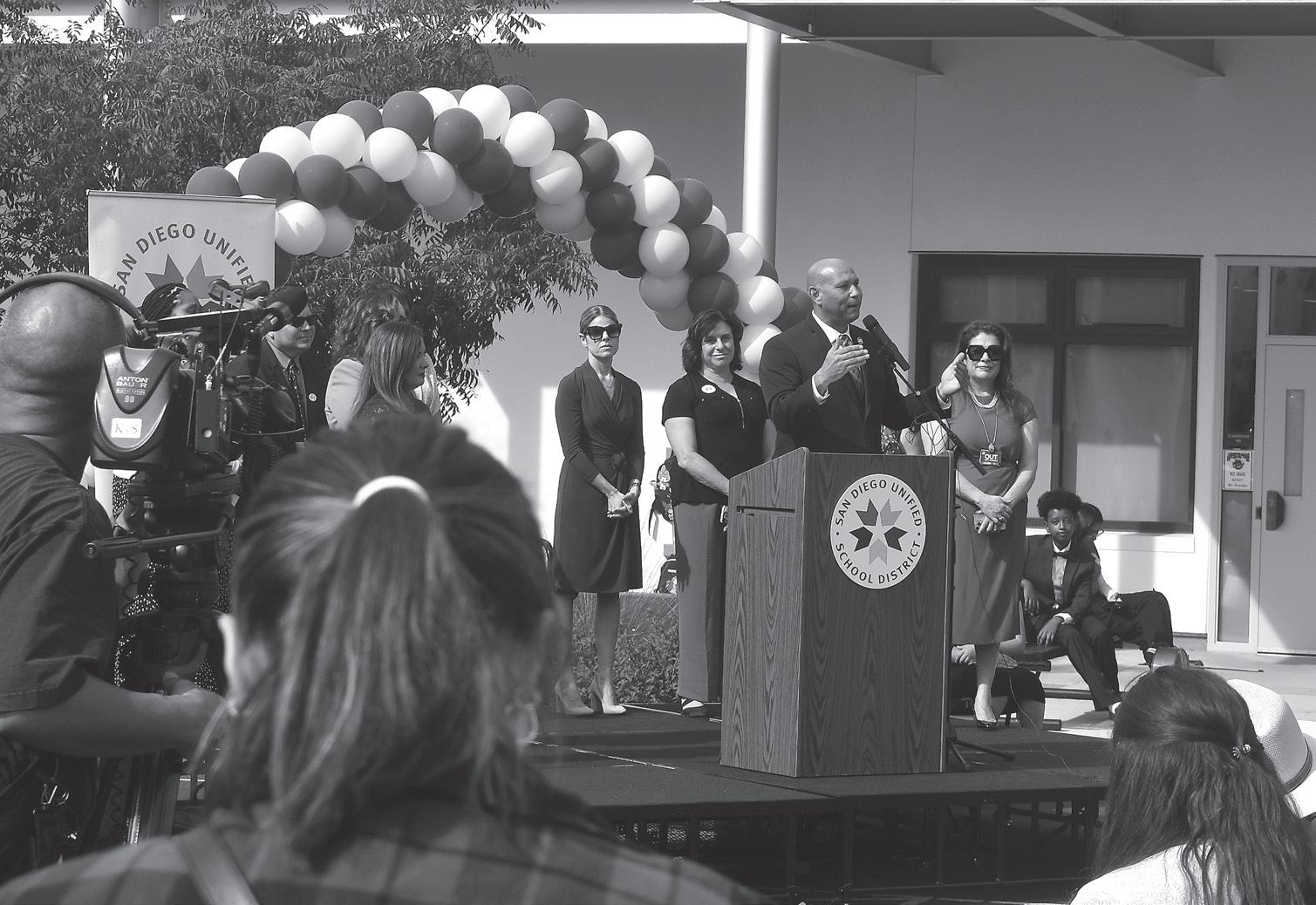
Standing on the grounds of her Grandfather’s legacy, Taj N. Stewart spoke to the audience with pride as she shared memories and sentiments of what education and civic service meant to Reverend Smith.
“My grandfather was a great man. He loved his family. He loved the church, and he loved his community. When I think about
education, when it comes to my grandfather, he was a lifelong learner,” said Stewart.


As a beacon for all vocational trades within K-12 education, the student body from Hoover High School, Central Elementary, and Wilson Middle School showcased their diverse talents and interests groups Wednesday morning. Kicking off with a festive welcome by the mariachi band, followed by a robotics demonstration from Wilson Middle. Other performances in the second half of the ceremony included a spirited drumline performance and a cheer routine from Hoover High School.
Built in the heart of City Heights, the construction of the facility reportedly cost about $100 million to build and was funded by voter-approved bond measures to repair, renovate, and revitalize neighborhood schools.
“When you go home this afternoon, I want you to say thank you to your parents, your grandparents, your aunts and uncles

to your neighbors, because they are the ones that made this happen,” said Richard Barrera, Board of Education Trustee, San Diego Unified.
Barrera went on to explain to the audience how the effort of getting the school finalized was a process fifteen years in the making and represented a sacrifice many generations of families made for the students who would ultimately get to inhabit it.
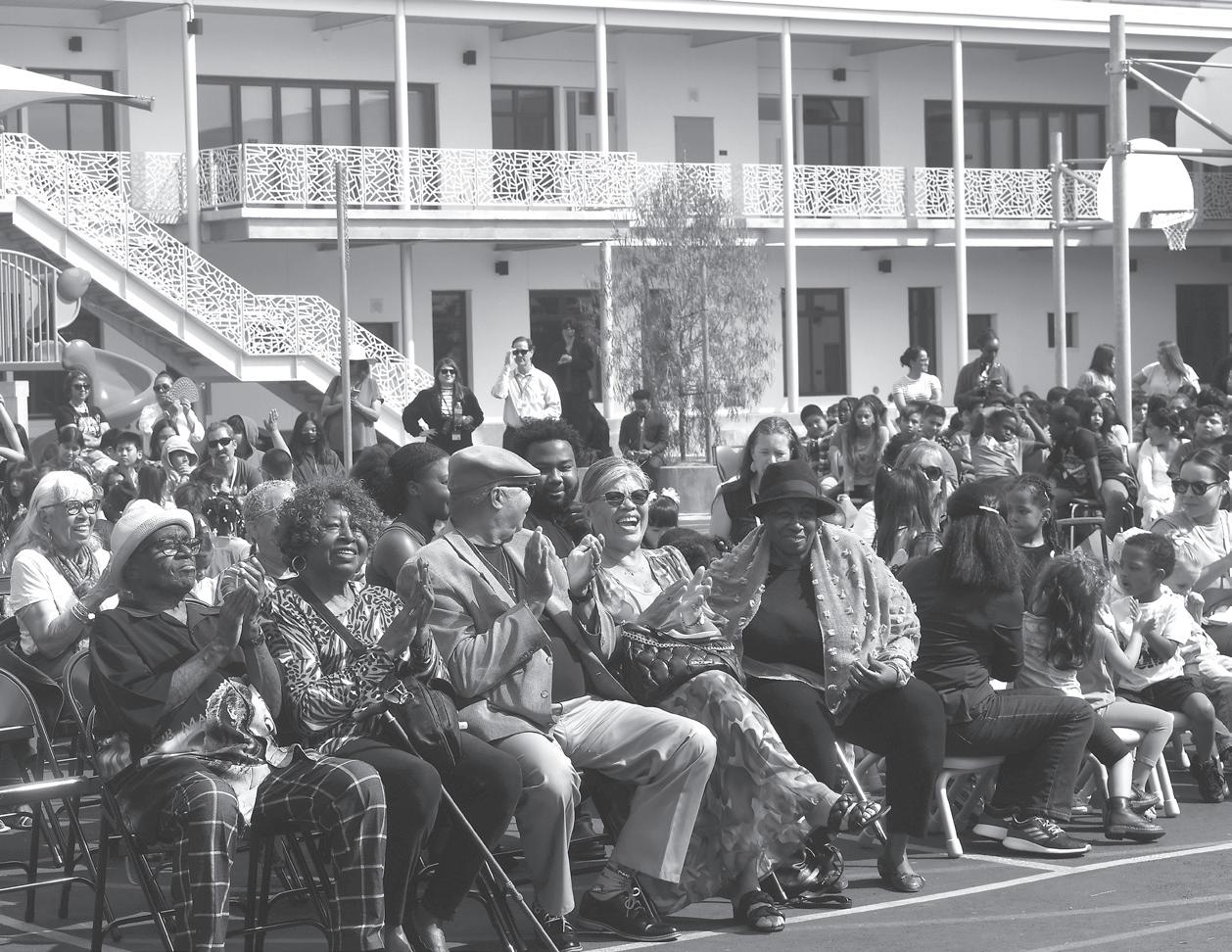
The newly constructed Central Elementary boasts nine new buildings with twenty-six classrooms that include preschool, kindergarten and special education rooms, as well as a library center, daycare, and an after-school program.
Carrying Reverend Walker Smith’s mission of diversifying education, Central representatives proudly boasted their diverse student body, stating that “many new immigrants find their first home on American soil here.”
Meanwhile over at Wilson Middle school, the facility includes seven new buildings, equipped with a new performing arts center, a health center, and an innovative three level parking structure with playcourts on the top floor.
“So as we focus on equity, belonging and thriving, the conditions are set for our students, for our families, for our educators to have what they need to be successful,” said Superintendent Jackson as he looked out at the audience.
Further remarks were heard from friends and family members of Reverend Smith as the ceremony closed out.
“Education is powerful regardless of how you obtained it. It is powerful, and no one can take it from you. I thank you all again. On behalf of my family. This beautiful campus is just amazing. It really is amazing. Thank you,” said Ms. Stewart.
With the education complex now officially open, the enduring influence of Reverend Walker Smith’s contributions to education and civic affairs will live on for future San Diego generations to come.
After the State Legislature’s Sept. 14 deadline to pass bills introduced this year, eleven education bills found their way to Gov. Gavin Newsom's desk for his signature.

The bills, sponsored and co-sponsored by State Superintendent of Public Instruction Tony Thurmond, fall into three categories: promoting inclusivity in the schools, building the teacher pipeline, and ensuring the well-being and success of California's students. The bills in the inclusivity category, all signed by Gov. Newsom on Sept. 23, focused primarily on the protection and rights of LGBTQ+ students.
“A small group of extremists has sought to divide communities by advancing policies to ban books related to civil rights for communities of color and the LGBTQ+ community, to force school districts to ‘out’ LGBTQ+ students, and to restrict inclusive curriculum,” Thurmond said.
Authored by Assemblymember Rick Chavez Zbur (D-Santa Monica), Assembly Bill (AB 5) requires staff training for schools with students from the seventh to the twelfth grade to better support LGBTQ+ students. Senate Bill (SB) 760, authored by Sen. Josh Newman (D-Fullerton), requires California's K–12 schools to ensure that students have access to all-gender restrooms. SB 857, authored by Sen. John Laird (D-Monterey), creates a task force to assess the needs of LGBTQ+ students and provide policy to meet those needs.
“These measures will help protect vulnerable youth, promote acceptance, and create more supportive environments in our schools and communities,” Newsom stated in a press release. The following bills have been enrolled and presented to the Governor for his consideration. Bills aimed at enhancing and expanding employment opportunities for teachers are the following:
See BILLS page 15





The Hornets-For-Lifers got together again, this time they chose the Legacy Hotel in Mission Valley to do their reminiscing, fellowshiping and laughing. Include some fancy dancing, good food, lively conversations and lots of Hornets-For-Life love and that explains the Class of 1978's big reunion night.
"This was a lot of fun, it was definitely great to see everybody. I wish some more could have made it but we always have a good time when we get together," shared a reunion attendee.
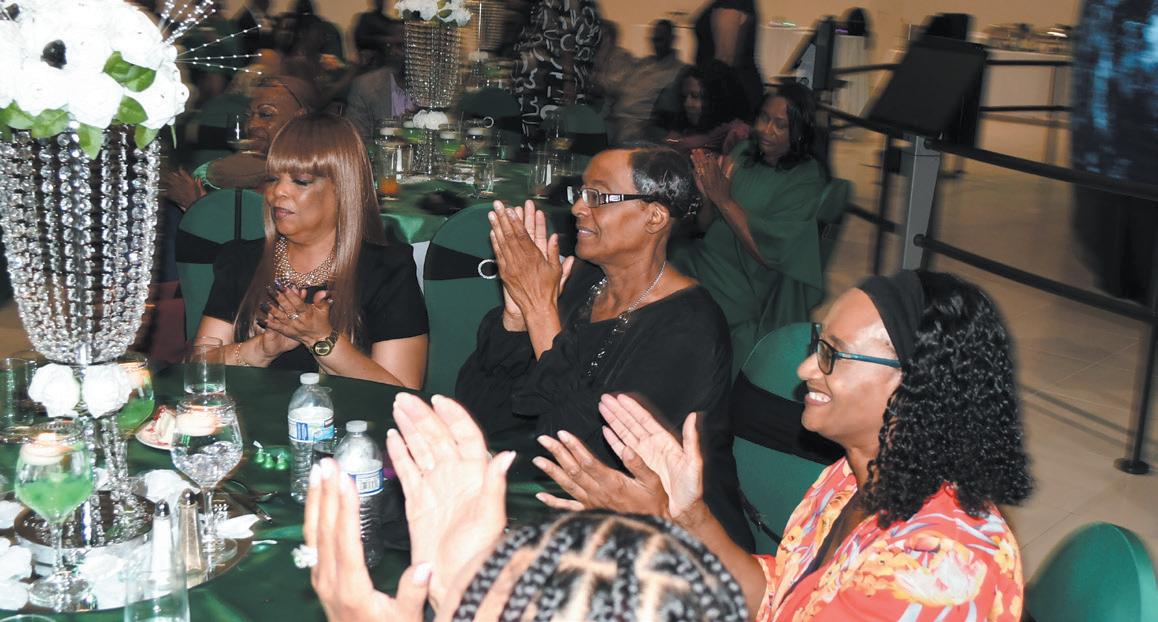
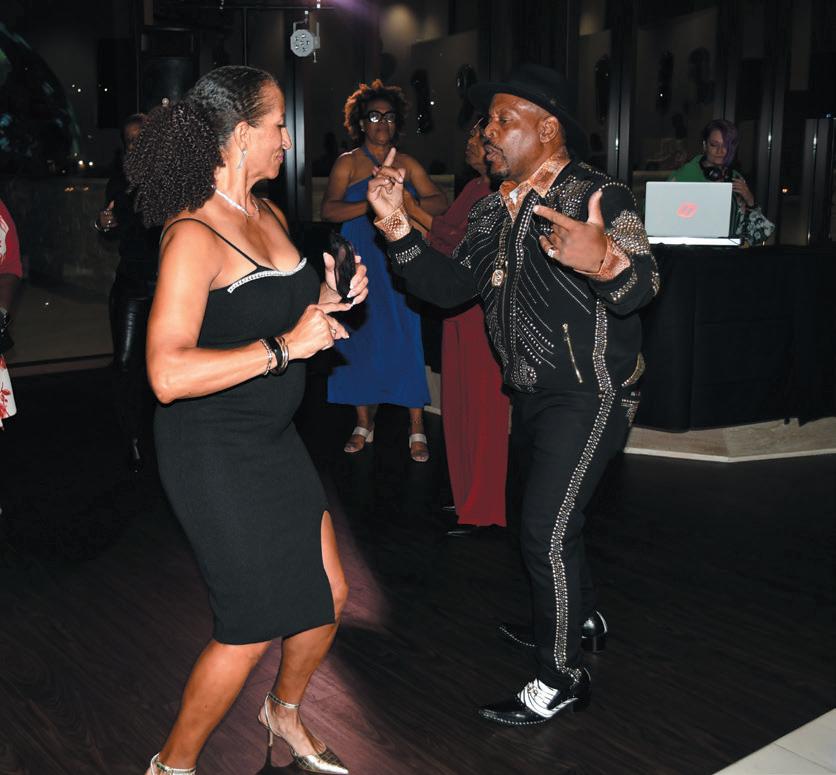



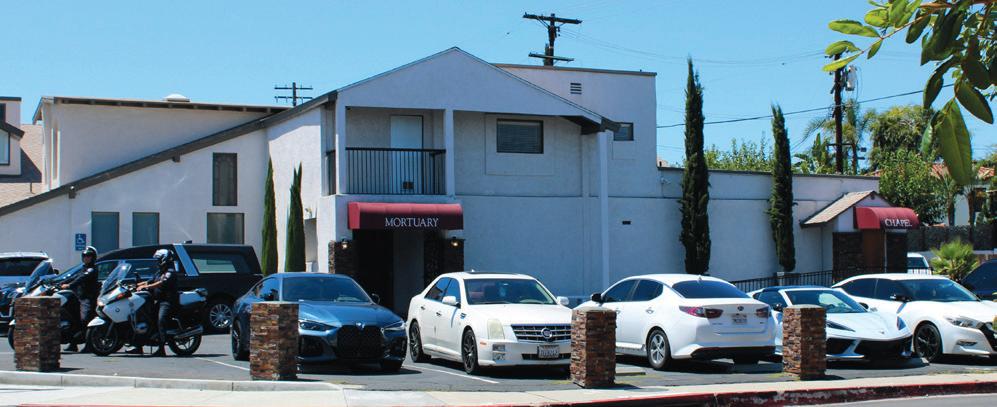









"I have to give props to Terry Harvey and the Reunion Committee for putting this together, they did another outstanding job," Class of 78's Best Dressed Male, Hornet Stanley Gentry, shared.




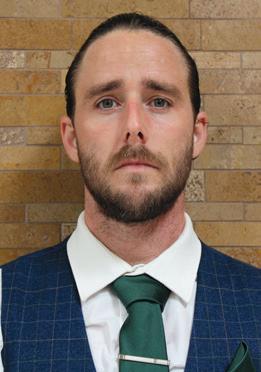

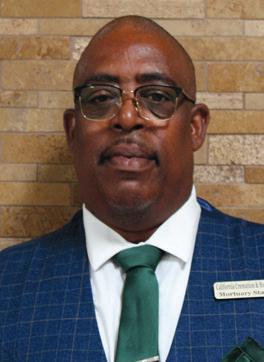

Reunion participants traveled from near and far to kick it with their classmates. Reunion President Terry Harvey, who came all the way from Missouri, had this to say about his comrades: "I think ‘78 is a very special class. We are very united and no one person thinks they are better than the next person. We were like that then and, for the most part, we are like that now.”
“Let me tell you, it's not easy putting an event like this together, especially from a distance. However, watching people have a good time makes it all worth it," Harvey said.








On the last Saturday of September, the 5th Annual Black Family Empowerment Day event was held at Marie Wideman Park in Southeast San Diego. The event, also known as “BFED”, featured an important discussion panel hosted by Dr. Keisha Blackinbaja, a live band, plenty of celebratory dancing, a fashion show and much-much more.



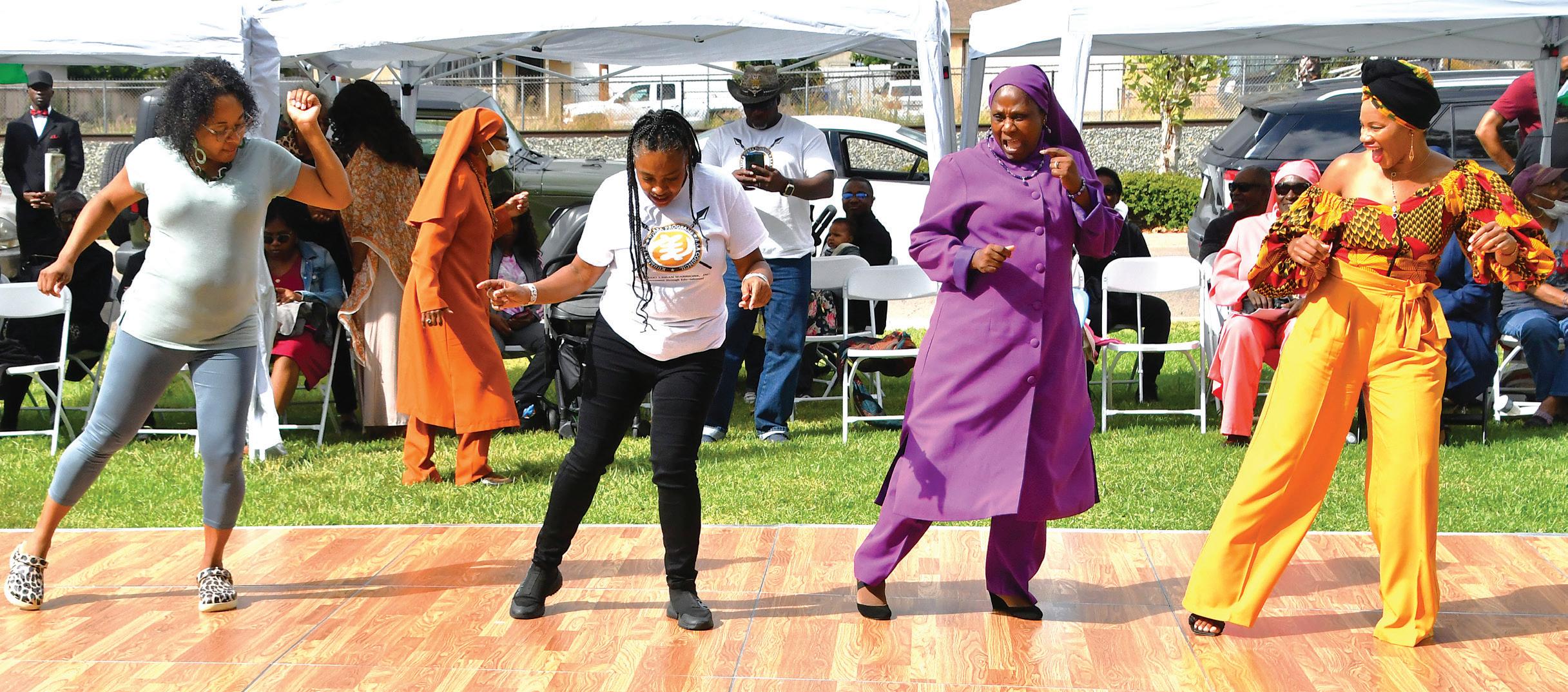

Dr. Kiesha and her guest panel touched on serious topics with a straight-talk approach. Topics concerning Black economics, health, reparations, and Black history and education were just some of the critical issues talked about at the 5th annual event.
The biggest accolades of the day happened when Mr. and Mrs. Ray and Pearly Killins were announced as this year’s much deserved Loving Elders, “Flowers Now” recipients. They were recognized for their many years of community work, leadership and contributions.


“It’s an honor to be recognized for your work. We really appreciate the honor and everybody that made this happen,” Pearly Killins said. Resource booths and entertainers were able to add to the big BFED celebration.

“Events like this are very important to the Black family. There was so much information concerning the Black experience, you had to learn something. We need more events like this,” former City District Manager David Monroe shared.

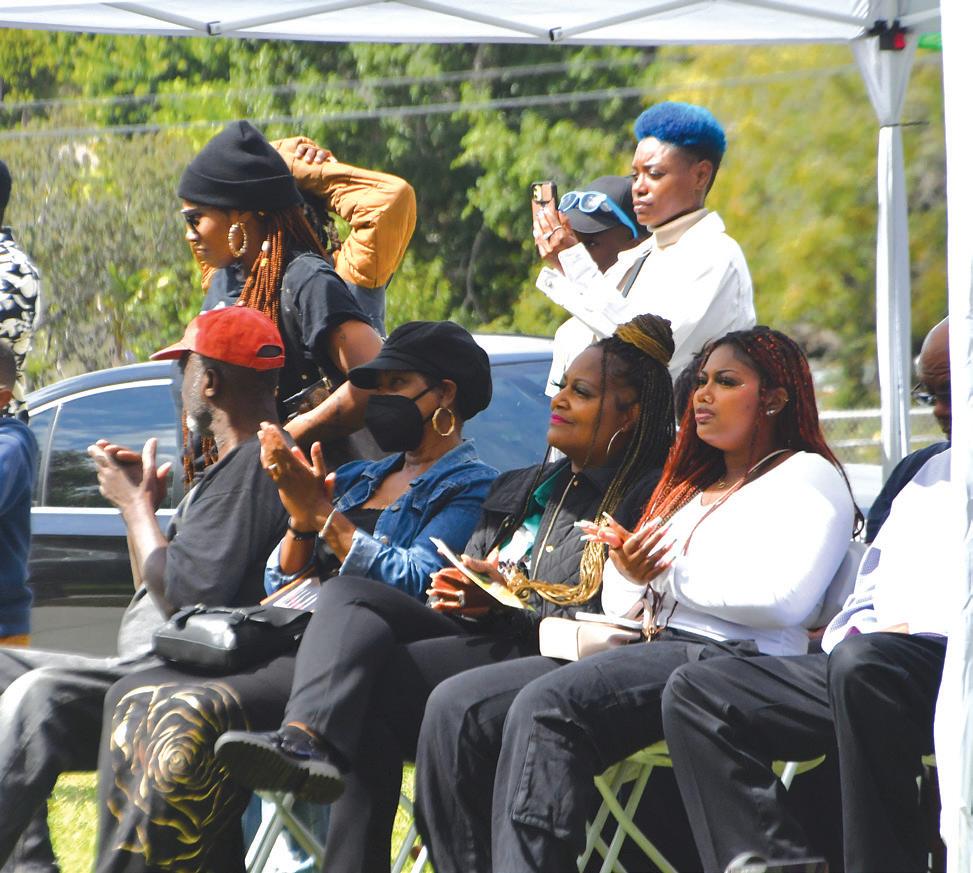

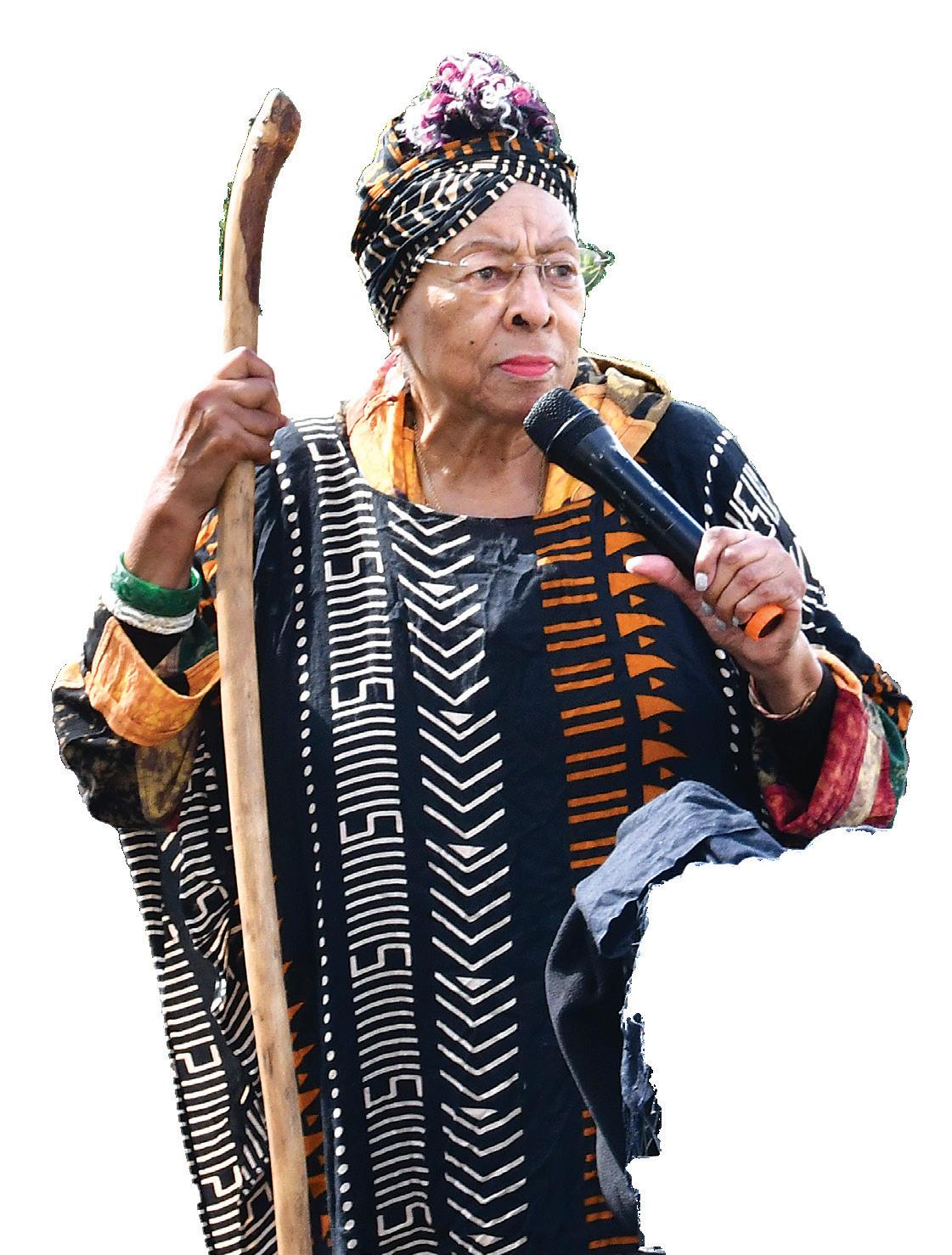
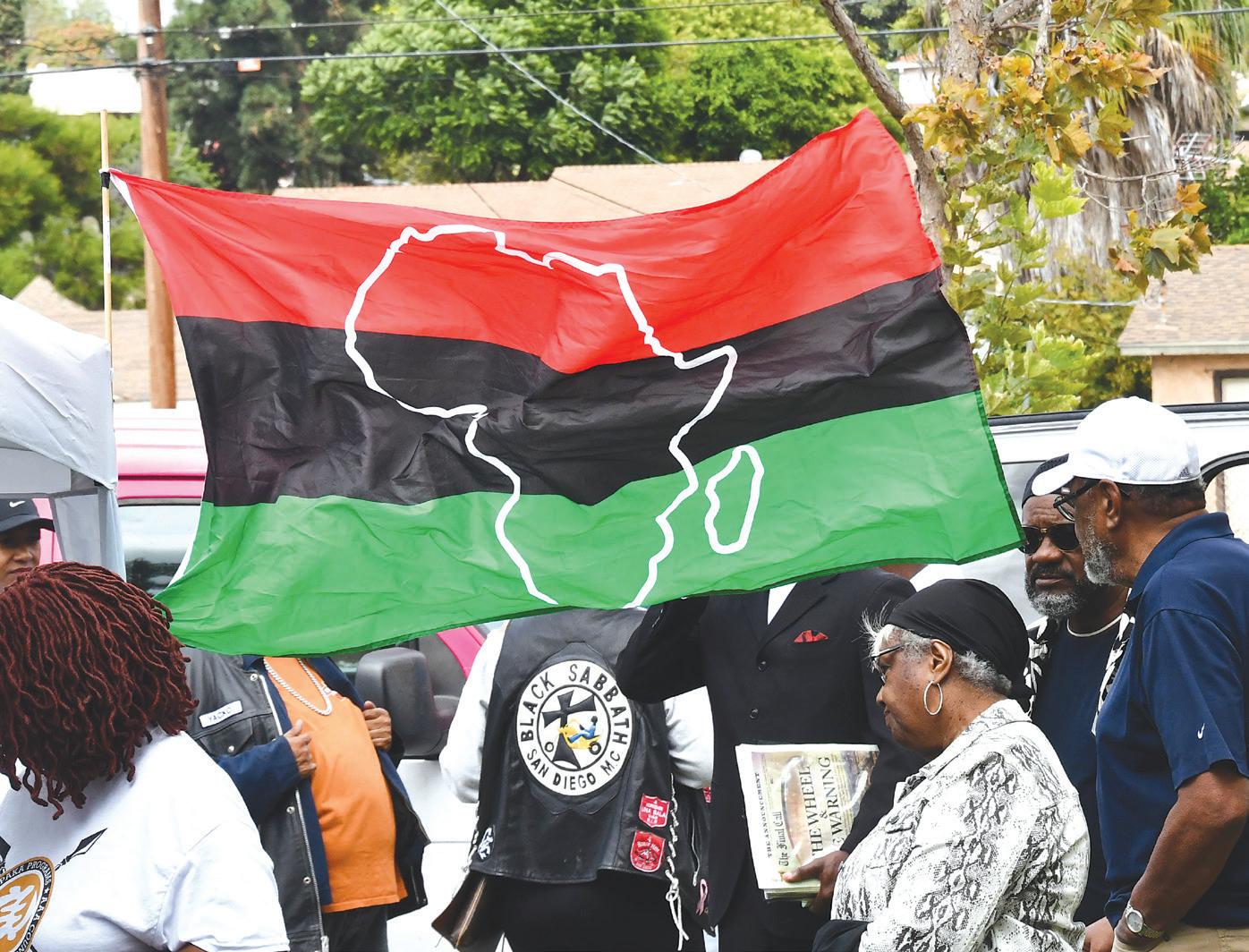


If you are a victim or witness to hate, racism or bullying – you can receive free support from California vs Hate. The hotline will help identify options for next steps after a hate act and make connections to community-specific resources. Anyone can report anonymously and your report will not be shared with law enforcement without your consent unless required by law.





For any questions, contact CA vs Hate at StopHate@calcivilrights.ca.gov.

As most business owners know, one of the most valuable assets your enterprise needs to thrive is top-notch talent.
With one in four U.S. adults currently looking for a new job, the right people are out there, it’s just a matter of connecting with them. According to CareerBuilder, here’s how to make your company attractive to job seekers and how to leverage tools to find them:

• Make room for growth: A recent survey from CareerBuilder and Morning Consult finds that when it comes to what’s most important to job seekers, it’s “good salary/benefits and interesting work.”
Give potential employees confidence that working for you will allow them to take care of their finances, provide for their families and do work that they are proud of.
Before posting the position, first seek out industry insights to ensure your compensation package is competitive. Also ensure that you’re offering a clear path for growth. During the interview process, let candidates know that if they are hired, you will invest the time and energy in seeing them develop professionally.
“Employers must get creative in their approach to skill development and training as a way to fill the existing skills gap and accelerate promotions,” says Kristin Kelley, chief marketing officer, CareerBuilder.
• Find your purpose: A people-oriented, purpose-driven work culture can help you not only attract great job candidates, but retain employees.
“Companies with a powerful mission, who also value their employees will stand the test of time. Creating an environment where people can thrive is equally important,” says Kelley.
• Be flexible: If the nature of your business allows for it, consider embracing new technologies that allow you to implement flexible work experiences, such as remote or hybrid work. Giving your employees the option to work from home is a key benefit that will attract talent, plus it could potentially broaden your pool nationwide or even internationally.
• Turn to easy-to-use hiring platforms: Finding the best fit for a given position can be extremely labor-inten -

sive and time-consuming. However, hiring software featuring industry-leading technology can make the process much smoother and more efficient. For example, recruiting solutions allow you to target your ideal job seekers with custom campaigns, build your talent pipeline, and source and screen candidates in a fraction of the time.
Talent acquisition is just one of a business owner’s many priorities. With the right mindset, strategies and tools, you can attract the best candidates for your business and bring them on board quickly.
StatePoint




Harvard University now has its first Black president,
Claudine Gay, who already has made her mark in the institution’s history. Gay also stands as only the second woman to helm the university since its founding in 1640 in Cambridge, Massachusetts.
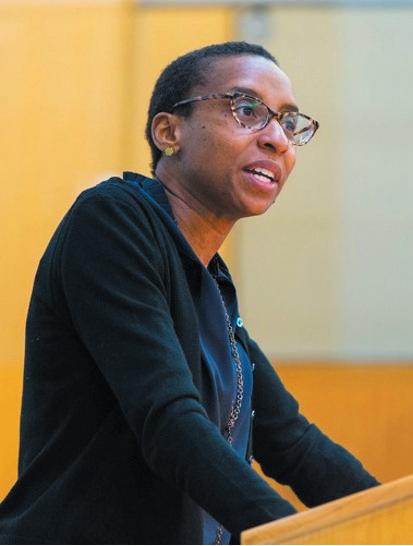
During her inaugural address, Gay articulated her vision for the Ivy League institution, acknowledging the weight and honor of this groundbreaking appointment.
“I stand before you today humbled by the prospect of leading Harvard,” remarked Gay amidst a rainy inauguration ceremony last Friday. “Emboldened by the trust you have placed in me and energized by your own commit -
ment to this singular institution and to the common cause of higher education.”
The new president went on to emphasize Harvard’s historical role as an agent of change, stating, “The courage of this University — our resolve, against all odds — to question the world as it is and imagine and make a better one: It is what Harvard was made to do,” she exclaimed.
Harvard Corporation, the university’s main governing body, chose Gay after an extensive search process. Gay earned her Ph.D. in government from Harvard in 1998 and joined the faculty in 2006. She previously held the distin-
guished position of Edgerley Family Dean of Harvard’s Faculty of Arts and Sciences and is recognized as an expert in political behavior. She also serves as the founding chair of the Inequality in America Initiative which was launched in 2017 to examine social and economic inequalities. Outgoing president Lawrence Bacow characterized her as “a person of bedrock integrity,” according to CNN. Bacow also expressed confidence in Gay’s “moral compass,” which he said remains essential for guiding the prestigious university. He praised the search committee for choosing Gay and predicted a bright future under her leadership.
After months of fruitless efforts to control spiraling gang violence in Haiti, a framework for defense cooperation has been signed by the United States and Kenya aimed at creating a multinational force to quash the violence that has brutally taken so many lives.
Such a deployment had been stalled for months because no country would agree to lead such a perilous mission.
This week, U.S. Defense Secretary Lloyd Austin and Kenya’s Defense Minister Aden Duale signed the accord authored by the U.S. and Ecuador at a meeting in Nairobi that will guide the countries defense relations for the next five years.
They are expected to be working behind the scenes to build support for the plan among the Security Council’s 15 members and in the wider international community.
Washington will supply “robust financial and logistical assistance” in the amount of $100 million to the proposed deployment.
“Signing the framework for defense cooperation between our two countries today reinforces the importance of our strategic partnership with Kenya,” Austin said following the meeting.
On Monday, Duale said his country was ready to deploy to Haiti and cited Kenya’s “very long history of global peacekeeping” in Kosovo, neighboring Somalia and Congo. For now, Kenya is expected to be the largest contributor with 1,000 police officers and troops. At least a dozen nations have now come forward to help tackle the gang violence engulfing the country.


Besides The Bahamas, Jamaica, Antigua and Barbuda, at least a dozen nations offering to join the effort to fight gang violence. Others countries stepping up are Italy, Spain, Mongolia, Senegal, Belize,
Suriname, Guatemala and Peru.
Assistant Secretary of State Brian Nichols was surprised at the numerous offers of support coming from Asia, Africa, Latin America, and the Caribbean. “People were saying, ‘Hey, we’re in, we’re going to support; we are going to provide troops, we’re going to provide police, we’re going to provide money,’ ” he recalled.
Haitian Americans and Haitians at home, however, are split on whether a Kenya-led intervention is a good idea, said Macollvie Neel, executive editor of Brooklyn-based Haitian Times, speaking with the online publication Semafor.
Many in the diaspora remember the sexual abuse and devastating cholera outbreak that accompanied foreign forces in past decades but they also said ongoing bloodshed in their country leaves them with few other options.
Also, perhaps worrying, the international force would not be a UN force, so if deployed, Kenyan police would be in charge rather than answer to a UN force commander as they would be required to do in a UN peacekeeping mission.
Still, cellphone repairman Jerthro Antoine, speaking to Al Jazeera news, said Kenya’s police can’t come soon enough. He said he dreams of strolling along one of Haiti’s beaches but the violence has gotten so bad that even walking on the street is a risk.
“I feel trapped in my home. Any foreign force in support of Haitian police is more than welcome,” Antoine said. “The Haitian people need it, we need a break and to have a life again.”
The mission is awaiting the U.N. Security Council's formal approval to go forward but has already received support from the U.N. and U.S.
South African history professor Mohamed Adhikari was one of the early writers to examine racial identity in the Coloured community. In 2005, identity was one of the hottest topics in popular and academic discourse when his book “Not White Enough, Not Black Enough: Racial Identity in the South African Coloured” appeared.
Now, a new book by journalists Lynsey Ebony Chutel and Tessa Dooms is again stimulating conversation and debate. “Coloured: How Classification Became Culture”” delves into the history of Coloured people as descendants of indigenous Africans and a people whose identity was shaped by colonization, slavery, and the racial political hierarchy it created.
Coloured as an ethnicity and racial demographic is intertwined in the creation of the South Africa we have today, writes Ms. Chutel. Yet often, Coloured communities are disdained as people with no clear heritage or culture — ‘not being Black enough or white enough.’
Dooms and Chutel’s book challenges this notion and presents a different angle to that narrative as it delves into the history of Coloured people as descendants of indigenous Africans and a people whose
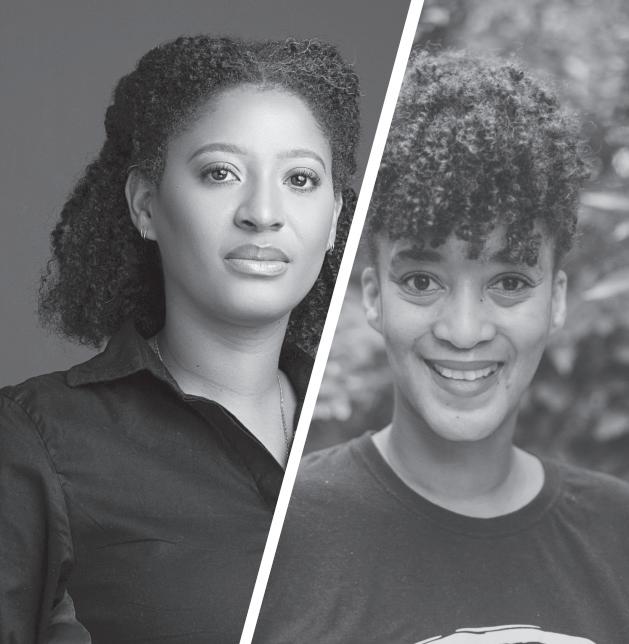
identity was shaped by colonization, slavery, and the racial political hierarchy it created.
This book is about the culture that Coloured communities have created for themselves through food, music, and shared lived experiences.
It was launched to a full house and an enthusiastic audience at Love Books in Johannesburg this month. The authors tell differing stories of how they and their families got there, and, moreover, to the apartheid classification "coloured".
Yet they also showed how that classification became community, and how communities developed cultures - based on music, food, and lived experience.
Lynsey Chutel writes for the New York Times from the Johannesburg bureau. She has written about the coronavirus pandemic in Africa, the death of Archbishop Desmond Tutu, the devastating legacy of mining and efforts to move away from coal.
Tessa Dooms is a sociologist, development practitioner, activist and a director at the Rivonia Circle, a knowledge hub for policy and political alternatives. Their book is available at Barnes and Noble.
By Lisa Vives Global Information Network
With the approach of national elections in Liberia, the U.S. has imposed visa restrictions, withholding travel in the U.S., for individuals “undermining democracy.”
The restrictions, announced by U.S. Secretary of State Antony Blinken, target people believed to be manipulating or rigging the electoral process, using violence or any other activity designed to improperly influence the outcome of an election.
Twenty candidates have their eyes on the Executive Mansion in Monrovia as Liberians go to the poll on Oct. 10. The posh residence is currently occupied by President George Weah, the former World Soccer Player of the Year who is seeking reelection for a second term as his six-year term comes to an end in January next year.
Only one of the presidential candidates is considered a serious challenger to the incumbent. Joseph Boakai is a former vice president of Liberia under Ellen Johnson-Sirleaf, whom Mr Weah defeated in a runoff after the 2017 election failed to produce a winner on the first ballot.
Mr Boakai graciously conceded defeat six
years ago. However, he appears to be poised for a fiercer fight this year.
Mr. Weah faces an uphill struggle. He must convince Liberians that he can perform better than he has so far. His administration has been blighted by high food prices and corrup-
tion scandals and the coalition that prodded him into office has pulled apart.
Last year, three key members (the Chief of Staff, Liberia’s Chief Prosecutor, and the Managing Director of the National Port Authority) of Mr Weah’s government were
indicted by the U.S. for involvement in public corruption.
Although Mr Weah suspended the officials so they could be investigated, an opposition leader, Alexander Cummings, accused the president of culpability for their alleged misdeeds.
Weah will also not enjoy an alliance with his predecessor, Mrs. Johnson-Sirleaf. That alliance has broken down.
Secretary Blinken clarified that the visa restriction policy is specifically targeted at certain individuals and not intended to affect the Liberian people or the government as a whole.
Amb. Joseph Boakai, former vice president and the UP-standard bearer warned it would be the end of Liberia if the ruling CDC steals the election. “…that’s why you need to protect it. If they think they’ll steal this election, you will not allow it because if they do it, that’s the end of this country,” said the 78-year-old former Vice President on his campaign trail.
In the 2022 corruption ranking of Transparency International, Liberia ranked 142 out of 180, six places worse than its 2021 ranking of 136.
AS TENSION GROWS, U.S. IMPOSES VISA RESTRICTIONS ON LIBERIANS ‘UNDERMINING DEMOCRACY’PHOTO: GIN L.Chutell and T. Dooms. PHOTO: GIN
6 Ways to Build Lasting Healthy Habits
Starting on a path toward healthy habits is often easier than maintaining them long term. This year, you can avoid a major pitfall of healthy resolutions and build healthy habits that stick by working small, positive steps into your daily life.

In fact, healthy habits are the first suggested treatment strategy for people whose blood pressure and cholesterol levels are creeping higher than normal, according to an American Heart Association scientific statement.
"The current guidelines for managing high blood pressure and cholesterol recognize that otherwise healthy individuals with mildly or moderately elevated levels of these cardiovascular risk factors should actively attempt to reduce these risks, and increasing physical activity is a great place to start," said Bethany Barone Gibbs, Ph.D., chair of the statement writing group and chair of the department of epidemiology and biostatistics at West Virginia University School of Public Health. These six ideas from the American Heart Association's Healthy for Good Habit Coach can help.
Myths
You may be surprised to learn the truth about creating and sticking to healthy habits. One myth is getting healthy means doing things you don't like. Research shows positive emotions make habits stick, so set your intentions on something you enjoy. Another misconception is big results require big changes, which may lead to overly ambitious habits. However, the simpler the routine is, the more likely it is to become habit.
Work with Your "Brain Loops"
Your brain creates "loops" for habits made up of three things: a cue, a routine and a reward. Each time the loop is repeated, it becomes more routine and may become automatic. Knowing this, you can design cues for developing new, healthy habits, such as setting walking shoes by the bed to start a walking habit. The routine is putting on the shoes and walking around the block, and the reward is the pleasant sensations and brighter mood
from a morning stroll.
Create Cues That Work for You
Most successful health habits begin with a cue. The cue can be external in your environment or internal in terms of your mindset. The more consistent the cue, the more likely it is to trigger the habit. Hacking your brain's reminder system can help you remember your cue. Some examples of visual cues are placing a sticky note where you'll see it often, keeping a water bottle on your desk or refrigerating fresh veggies at eye level.
Build a Routine That Supports Your Goals
Positive and consistent habits are important to achieve your personal goals. Small habits done consistently can add up to big results. To create a new healthy habit, think through the steps that could lead to your desired outcome. Ask yourself whether you want to do it, if it's easy and if it's high impact. It's important to choose habits that make a difference and move you closer to your goals.
For example, if one of your goals is improving your heart health, a meaningful habit might be to move more. Increasing physical activity can help lower blood pressure and cholesterol along with many other health benefits, Gibbs said.
"Every little bit of activity is better than none," she said. "Even small initial increases of 5-10 minutes a day can yield health benefits."
Start by choosing a habit you enjoy that's rewarding by itself. If you're more of a dancer than runner, increase your physical activity with an upbeat dance class. You might also look for a more enjoyable version of a new habit, such as getting more fruits and veggies by sipping on a delicious smoothie.
Understand Resets are Part of the Process
New habits are experiments. If they don't stick, you haven't failed. Instead, you've learned what doesn't work, which is useful. Get curious and ask yourself which part of the habit didn't work for you. Maybe the cue was ineffective. Maybe the steps of the routine were too ambitious and you need to split them into smaller, easier steps. If you realize you don't enjoy the habit, stop doing it and try something else.
Find more inspiration and ideas to jumpstart healthy habits this year at heart.org/ habits.
Family Features
For new college graduates, receiving that first post-degree paycheck can be almost as exciting as getting the diploma itself. But it also presents a challenge: Given the many demands on a young person's budget, how should those funds be managed?
We asked five money experts to share their best personal finance strategies to help this year's college grads successfully launch their financial lives. Here's what they said.
PHOTO: Tima Miroshnichenko/Pexels
To figure out how to allocate your money toward needs, wants and everything else, Erin Lowry, author of the "Broke Millennial Workbook," suggests budgeting. Starting with accounting for large items like rent, car payments and food, you can then see what nonessentials also fit. Writing out the budget helps you figure out what you can afford and when, she adds.
Melissa Jean-Baptiste, a financial educator and the author of the book "So... This Is Why I'm Broke," suggests setting aside some time to really understand your first paycheck and all those deductions. "Take yourself on a money date so you understand how much you're bringing home and how much you have left to save and invest," she says.
Even if they're paying off debt, Alex Rezzo, a certified financial planner and the founder of Andante Financial in the Los Angeles area, urges new grads to start saving for retirement right away. "There will always be a more immediate excuse to delay saving for retirement," he says, but he urges people to find a way to save at least 1% of each paycheck and to increase that amount over time.
He also suggests parking your direct-deposited paycheck funds in an online bank that offers a competitive high-yield account and is backed by the Federal Deposit Insurance Corp. That way, the money likely will earn more than it would sitting in a traditional bank's checking or savings account.
As you build your independent financial life, making at least the minimum payments on your student loan and credit card accounts can help protect your credit. Missing a payment, Lowry says, could damage your credit score. She suggests focusing on paying down any high-interest debt first to reduce the

total amount going to interest.
Lowry also suggests freezing or locking your credit, which makes it much harder for identity thieves to apply for new credit in your name. Just remember that if you freeze your credit, you'll also have to thaw it if you want to apply for credit yourself, she says, adding, "you might want to wait until you're through a period of time when you're applying for new accounts."
MAKE MISTAKES AND LEARN FROM THEM
Kennedy Reynolds, chief education officer at Acorns, a financial services company, says mistakes are part of the learning process, whether it's overspending or accruing credit card debt, but the key is to learn from the experience. "If you have debt to pay down, take that paycheck and split it up" toward those bills until they are paid off, she says.
"Try to picture yourself later and know that the choices you're making now will have a long-term impact," she adds.
LOOK BEYOND YOUR PAYCHECK
Linda Whiteman, a personal finance teacher at Outschool, an online learning platform for kids, teaches her students to think entrepreneurially. After all, she tells them, most millionaires are business owners.
"You don't have to work for someone," she says. She asks her students to consider what they can teach others, whether offering piano lessons online or creating digital art. Pursuing additional income streams outside of a paycheck can help grow wealth, she adds.
Jean-Baptiste found success doing exactly that: She used her experience as a teacher to create and sell lesson plans online. "I was bringing in $10,000 a year that I could put toward debt," she says. Her lesson plans eventually turned into the financial literacy business that she operates today.
Earning additional income outside of a paycheck, she says, "can be a game-changer"financial wisdom that applies at any age.
EDUCATION PHOTO: Photos courtesy of Getty Images via Family Features
The Centers for Disease Control and Prevention recommends new COVID-19 booster vaccines for all — but many who need them most won’t get them. About 75% of people in the United States appear to have skipped last year’s bivalent booster, and nothing suggests uptake will be better this time around.
As the effects of vaccines offered in 2021 have diminished over time, boosters have been shown to strongly protect people against severe COVID and death, and more modestly prevent infection.

They can have a dramatic impact on those most likely to die from COVID, such as older adults and immunocompromised people. Public health experts say re-upping vaccination is also important for
those in group housing, like prisons and nursing homes, where the virus can move swiftly between people in close quarters. A boost in protection is also needed to offset the persistent disparities in the toll of COVID between racial and ethnic groups.
PHOTO: RF._.studio/Pexelscines. Hospitalizations and deaths due to COVID have risen in recent weeks, and COVID remains a leading cause of death, with roughly 7,300 people dying of the disease in the past three months. Complicating matters, this is the first round of COVID vaccines 12 Thursday, o c Tober 5, 2023 • The San Diego Voice & Viewpoint www.sdvoice.info HEALTHY LIVING COVID-19 UPDATES
WITH AIDS AND EMERGENCY SOLUTIONS
GRANT PROGRAMS. Notice is hereby given that the Board of Supervisors will hold a public hearing at 9:00 a.m. on October 24, 2023, in Room
310 at the County Administration Center, 1600 Pacific Highway, San Diego, CA, regarding the Fiscal Year (FY) 2024-25 Annual Plan Strategy. The County of San Diego develops an Annual Plan each year to identify specific projects to be funded during the upcoming fiscal year, through the four federal entitlement programs administered by the Health and Human Services Agency, Housing and Community Development Services: Community Development Block Grant (CDBG), HOME Investment Partnerships (HOME), Housing Opportunities for Persons with AIDS (HOPWA) and Emergency Solutions Grant (ESG). The Annual Plan Strategy will help guide the development of the Annual Plan. The CDBG and ESG Programs fund housing and community development activities in the Urban County which is comprised of the unincorporated area and six participating cities (Coronado, Del Mar, Imperial Beach, Lemon Grove, Poway, and Solana Beach). The HOME Program provides funds for housing activities in the HOME Consortium jurisdiction which includes the Urban County, as well as six Consortium cities (Carlsbad, Encinitas, La Mesa, San Marcos, Santee, and Vista).
The HOPWA Program serves the entire San Diego County region. The FY 2024-25 Annual Plan must be completed each year for the County's CDBG, HOME, HOPWA and ESG programs.
Prior to the development of the Annual Plan, the County outlines an Annual Plan Strategy which identifies funding priorities and processes for the upcoming year. The outline of the current Annual Plan Strategy can be viewed electronically at the Housing and Community Development Services website: https://www.sandiegocounty.g ov/sdhcd/index.html The public is invited to attend the public hearing to comment on the Annual Plan Strategy, and to obtain the views of citizens on housing and community development needs prior to the preparation of the FY 2024-25 Annual Plan. The public may also provide comments in writing during the 30-day comment period ending October 24, 2023. Written comments should be addressed to Housing and Community Development Services, Community Development Division, 3989 Ruffin Road, San Diego, CA 92123, 858-694-8756, or by email to Community.Development@sd county.ca.gov. Those who are deaf or hard of hearing may contact the department at (866) 945-2207. Those who need assistance to participate in the meeting (non-English speaking, hearing impaired, etc.) should contact staff at least five days prior to the meeting to request special arrangements. 10/5/23 CNS-3740066#

Classified ads can be placed in person, by phone, fax, or email Monday-Thursday 9:30 a.m. - 3:30 p.m.
F:619-266-0533

NAME
This fictitious business name will expire on September 06, 2028 9/14, 9/21, 9/28, 10/05
NAME
NAME
Fictitious business name(s) to be abandoned: Burrito Leo's Mexican Food Located at: 3170 Main Street San Diego, CA 92113 County of San Diego
This business is conducted by: An Individual
The Fictitious business name referred to above was filed in San Diego County on: 02/03/2022 and assigned File no. 2022-9002894
The fictitious business name is being abandoned by: Leonardo Urrutia Jr. 6140 1/2 Acorn Street San Diego, CA 92115
This statement was filed with the Recorder/County Clerk of San Diego County September 15, 2023
9/21, 9/28, 10/05, 10/12
SUPERIOR COURT OF CALIFORNIA
330 West Broadway San Diego, CA 92101 Hall Of Justice
37-2023-00041815CU-PT-CTL
Petitioner or Attorney: Hangyul Lee Drennan
To All Interested Persons: Petitioner Hangyul Lee Drennan filed a petition with this court for a decree changing names as follows:
PRESENT NAME:
Hangyul Lee Drennan
PROPOSED NAME: Alice Hangyul Lee
THE COURT ORDERS that all persons interested in this matter appear before this court at the hearing indicated below to show cause, if any, why the petition for change of name should not be granted.
Any person objecting to the name changes described above must file a written objection that includes the reasons for the objection at least two court days before the matter is scheduled to be heard and must appear at the hearing to show cause why the petition should not be granted. If no written objection is timely filed, the court may grant the petition without a hearing.
NOTICE OF HEARING
Date: November 09, 2023
Time: 8:30 A.M. Dept. 61
(To appear remotely, check in advance of the hearing for information about how to do so on the court's website. To find your court's website go to www.courts.ca.gov/find-mycourt.htm)
NO HEARING WILL OCCUR ON THE DATE SPECIFIED IN THE ORDER TO SHOW CAUSE.
The court will review the documents filed as of the date specified on the Order to Show Cause for Change of Name (JC Form #NC-120).
If all requirements for a name change have been met as of the date specified, and no timely written objection has been received (required at least two court days before the date specified), the Petition for Change of Name (JC Form #NC-100) will be granted without a hearing. One copy of the Order Granting the Petition will be mailed to the petitioner.
To change a name on a legal document, including a birth certificate, social security card, driver license, passport, and other identification, a certified copy of Decree
Change of
and for Issuance
New Birth Certificate
Form #NC-230) may be required. Contact the agency(ies) who issue the legal document that needs to be changed, to determine if a certified copy is required.
Change of
and for Issuance of New Birth Certificate (JC Form #NC-230) may be obtained from the Civil Business Office for a fee. Petitioners who are seeking a change of name under the Safe at Home program may contact the assigned department for the information on obtaining certified copies.
If all the requirements have not been met as of the date specified, the court will mail the petitioner a written order with further directions.
If a timely objection is filed, the court will set a hearing date and contact the parties by mail with further directions.
A RESPONDENT OBJECTING TO THE NAME CHANGE MUST FILE A WRITTEN OBJECTION AT LEAST TWO COURT DAYS (excluding weekends and holidays) BEFORE THE DATE SPECIFIED. Do not come to court on the specified date. The court will notify the parties by mail of a future hearing date
Any Petition for the name change of a minor that is signed by only one parent must have this Attachment served along with the Petition and Order to Show Cause, on the other nonsigning parent, and proof of service must be filed with the court. The address of the court is: 330 West Broadway San Diego, CA 92101 10/05, 10/12, 10/19, 10/26
SUPERIOR COURT OF CALIFORNIA 330 West Broadway San Diego, CA 92101 Hall Of Justice 37-2023-00041237CU-PT-CTL Petitioner or Attorney: Kimber Buie Salter
To All Interested Persons: Petitioner Kimber Buie Salter filed a petition with this court for a decree changing names as follows:
PRESENT NAME: Kimber Buie Salter
PROPOSED NAME: KimberAnne Buie Bey THE COURT ORDERS that all persons interested in this matter appear before this court at the hearing indicated below to show cause, if any, why the petition for change of name should not be granted.
Any person objecting to the name changes described above must file a written objection that includes the reasons for the objection at least two court days before the matter is scheduled to be heard and must appear at the hearing to show cause why the petition should not be granted. If no written objection is timely filed, the court may grant the petition without a hearing.
NOTICE OF HEARING
Date: November 07, 2023 Time: 8:30 A.M. Dept. 61 (To appear remotely, check in advance of the hearing for information about how to do so on the court's website. To find your court's website
as of the date specified, and no timely written objection has been received (required at least two court days before the date specified), the Petition for Change of Name (JC Form #NC-100) will be granted without a hearing. One copy of the Order Granting the Petition will be mailed to the petitioner.
To change a name on a legal document, including a birth certificate, social security card, driver license, passport, and other identification, a certified copy of Decree Changing Name (JC Form #NC-130) or Decree Changing Name and Order Recognizing Change of Gender and for Issuance of New Birth Certificate (JC Form #NC-230) may be required. Contact the agency(ies) who issue the legal document that needs to be changed, to determine if a certified copy is required.
A certified copy of Decree Changing Name (JC Form #NC-130) or Decree Changing Name and Order Recognizing Change of Gender and for Issuance of New Birth Certificate (JC Form #NC-230) may be obtained from the Civil Business Office for a fee. Petitioners who are seeking a change of name under the Safe at Home program may contact the assigned department for the information on obtaining certified copies.
If all the requirements have not been met as of the date specified, the court will mail the petitioner a written order with further directions.
If a timely objection is filed, the court will set a hearing date and contact the parties by mail with further directions.
A RESPONDENT OBJECTING TO THE NAME CHANGE MUST FILE A WRITTEN OBJECTION AT LEAST TWO COURT DAYS (excluding weekends and holidays) BEFORE THE DATE SPECIFIED. Do not come to court on the specified date. The court will notify the parties by mail of a future hearing date
Any Petition for the name change of a minor that is signed by only one parent must have this Attachment served along with the Petition and Order to Show Cause, on the other nonsigning parent, and proof of service must be filed with the court.
The address of the court is:
330 West Broadway San Diego, CA 92101 9/28, 10/05, 10/12, 10/19
SUPERIOR COURT OF CALIFORNIA
325 South Melrose Dr. Vista, CA 92081 North County Regional Center
37-2023-00039977CU-PT-CTL Petitioner or Attorney: Chad A. Speck
To All Interested Persons: Petitioner Chad A.Speck and Marnaie Gonzales filed a petition with this court for a decree changing names as follows:
PRESENT NAME: Lennon Olivia Gonzales
PROPOSED NAME: Lennon Olivia GonzalesSpeck
THE COURT ORDERS that all persons interested in this matter appear before this court at the hearing indicated below to show cause, if any, why the petition for change of name should not be granted. Any person objecting to the name changes described above must file a written objection that includes the reasons for the objection at least two court days before the matter is scheduled to be heard and must appear at the hearing to show cause why the petition should not be granted. If no written objection is timely filed, the court may grant the petition without a hearing.
NOTICE OF HEARING Date: November 17, 2023 Time: 8:30 A.M.
The court will review the documents filed as of the date specified on the Order to Show Cause for Change of Name (JC Form #NC-120).
If all requirements for a name change have been met as of the date specified, and no timely written objection has been received (required at least two court days before the date specified), the Petition for Change of Name (JC Form #NC-100) will be granted without a hearing. One copy of the Order Granting the Petition will be mailed to the petitioner.
To change a name on a legal document, including a birth certificate, social security card, driver license, passport, and other identification, a certified copy of Decree Changing Name (JC Form #NC-130) or Decree Changing Name and Order
Recognizing Change of Gender and for Issuance of New Birth Certificate (JC Form #NC-230) may be required. Contact the agency(ies) who issue the legal document that needs to be changed, to determine if a certified copy is required.
A certified copy of Decree Changing Name (JC Form #NC-130) or Decree Changing Name and Order Recognizing Change of Gender and for Issuance of New Birth Certificate (JC Form #NC-230) may be obtained from the Civil Business Office for a fee. Petitioners who are seeking a change of name under the Safe at Home program may contact the assigned department for the information on obtaining certified copies.
If all the requirements have not been met as of the date specified, the court will mail the petitioner a written order with further directions.
If a timely objection is filed, the court will set a hearing date and contact the parties by mail with further directions.
A RESPONDENT OBJECTING TO THE NAME CHANGE MUST FILE A WRITTEN OBJECTION AT LEAST TWO COURT DAYS (excluding weekends and holidays) BEFORE THE DATE SPECIFIED. Do not come to court on the specified date. The court will notify the parties by mail of a future hearing date
Any Petition for the name change of a minor that is signed by only one parent must have this Attachment served along with the Petition and Order to Show Cause, on the other nonsigning parent, and proof of service must be filed with the court.
The address of the court is:
330 West Broadway San Diego, CA 92101
9/28, 10/05, 10/12, 10/19
SUPERIOR COURT OF CALIFORNIA
330 West Broadway San Diego, CA 92101 Hall Of Justice 37-2023-00037391CU-PT-CTL Petitioner or Attorney:
Kathryn Marie Becker
To All Interested Persons: Petitioner
Kathryn Marie Becker filed a petition with this court for a decree changing names as follows:
PRESENT NAME:
Kathryn Marie Becker
PROPOSED NAME:
Kathryn Marie Monroe
THE COURT ORDERS that all persons interested in this matter appear before this court at the hearing indicated below to show cause, if any, why the petition for change of name should not be granted.
Any person objecting to the name changes described above must file a written objection that includes the reasons for the objection at least two court days before the matter is scheduled to be heard and must appear at the hearing to show cause why the petition should not be granted. If no written objection is timely filed, the
court may grant the petition without a hearing.
NOTICE OF HEARING
Date: October 12, 2023
Time: 8:30 A.M. Dept. 61
(To appear remotely, check in advance of the hearing for information about how to do so on the court's website. To find your court's website go to www.courts.ca.gov/find-mycourt.htm)
NO HEARING WILL OCCUR ON THE DATE SPECIFIED IN THE ORDER TO SHOW CAUSE.
The court will review the documents filed as of the date specified on the Order to Show Cause for Change of Name (JC Form #NC-120).
If all requirements for a name change have been met as of the date specified, and no timely written objection has been received (required at least two court days before the date specified), the Petition for Change of Name (JC Form #NC-100) will be granted without a hearing. One copy of the Order Granting the Petition will be mailed to the petitioner.
To change a name on a legal document, including a birth certificate, social security card, driver license, passport, and other identification, a certified copy of Decree
Changing Name (JC Form #NC-130) or Decree
Changing Name and Order
Recognizing Change of Gender and for Issuance of New Birth Certificate (JC Form #NC-230) may be required. Contact the agency(ies) who issue the legal document that needs to be changed, to determine if a certified copy is required.
A certified copy of Decree
Changing Name (JC Form #NC-130) or Decree
Changing Name and Order
Recognizing Change of Gender and for Issuance of New Birth Certificate (JC Form #NC-230) may be obtained from the Civil Business Office for a fee. Petitioners who are seeking a change of name under the Safe at Home program may contact the assigned department for the information on obtaining certified copies.
If all the requirements have not been met as of the date specified, the court will mail the petitioner a written order with further directions.
If a timely objection is filed, the court will set a hearing date and contact the parties by mail with further directions.
A RESPONDENT
OBJECTING TO THE NAME CHANGE MUST FILE A WRITTEN OBJECTION AT LEAST TWO COURT DAYS (excluding weekends and holidays) BEFORE THE DATE SPECIFIED. Do not come to court on the specified date. The court will notify the parties by mail of a future hearing date
Any Petition for the name change of a minor that is signed by only one parent must have this Attachment served along with the Petition and Order to Show Cause, on the other nonsigning parent, and proof of service must be filed with the court.
The address of the court is: 330 West Broadway San Diego, CA 92101 9/14, 9/21, 9/28, 10/05
SUPERIOR COURT OF CALIFORNIA
why the petition for change of name should not be granted.
Any person objecting to the name changes described above must file a written objection that includes the reasons for the objection at least two court days before the matter is scheduled to be heard and must appear at the hearing to show cause why the petition should not be granted. If no written objection is timely filed, the court may grant the petition without a hearing.
NOTICE OF HEARING
Date: October 11, 2023
Time: 8:30 A.M. Dept. 61
(To appear remotely, check in advance of the hearing for information about how to do so on the court's website. To find your court's website go to www.courts.ca.gov/find-mycourt.htm)
NO HEARING WILL OCCUR ON THE DATE SPECIFIED IN THE ORDER TO SHOW CAUSE.
The court will review the documents filed as of the date specified on the Order to Show Cause for Change of
Name (JC Form #NC-120).
If all requirements for a name change have been met as of the date specified, and no timely written objection has been received (required at least two court days before the date specified), the Petition for Change of Name (JC Form #NC-100) will be granted without a hearing. One copy of the Order Granting the Petition will be mailed to the petitioner.
To change a name on a legal document, including a birth certificate, social security card, driver license, passport, and other identification, a certified copy of Decree
Changing Name (JC Form #NC-130) or Decree
Changing Name and Order
Recognizing Change of Gender and for Issuance of New Birth Certificate (JC Form #NC-230) may be required. Contact the agency(ies) who issue the legal document that needs to be changed, to determine if a certified copy is required.
A certified copy of Decree
Changing Name (JC Form #NC-130) or Decree
Changing Name and Order
Recognizing Change of Gender and for Issuance of New Birth Certificate (JC Form #NC-230) may be obtained from the Civil Business Office for a fee. Petitioners who are seeking a change of name under the Safe at Home program may contact the assigned department for the information on obtaining certified copies.
If all the requirements have not been met as of the date specified, the court will mail the petitioner a written order with further directions.
If a timely objection is filed, the court will set a hearing date and contact the parties by mail with further directions.
A RESPONDENT OBJECTING TO THE NAME CHANGE MUST FILE A WRITTEN OBJECTION AT LEAST TWO COURT DAYS (excluding weekends and holidays) BEFORE THE DATE SPECIFIED. Do not come to court on the specified date. The court will notify the parties by mail of a future hearing date
Any Petition for the name change of a minor that is signed by only one parent must have this Attachment served along with the Petition and Order to Show Cause, on the other nonsigning parent, and proof of service must be filed with the court.
The address of the court is: 330 W. Broadway San Diego, CA 92101 9/14, 9/21, 9/28,
TO THE CLERK: Please dismiss this action as follows: Entire action of all parties and all causes of action
The court did waive court fees and costs for a party in this in this case.
Date: 9/21/2023
The address of the court is: 330 W. Broadway San Diego, CA 92101
Court's Recovery of Waived Court Fees And Costs
If a party whose court fees and costs were initially waived has recovered or will recover $10,000 or more in value by way of settlement, compromise, arbitration award, mediation settlement, or other means, the court has a statutory lien on that recovery. The court may refuse to dismiss the case until the lien is satisfied.
Declaration Concerning Waived Court Fees
The court waived fees and costs in this action for: Vanessa Valdez
The person named in item 1 is not recovering anything of value by this action.
All court fees and court costs that were waived in this action have been paid to the court 9/28, 10/05, 10/12, 10/19
SUMMONS (Citacion Judicial)
NOTICE TO DEFENDANT (AVISO AL DEMANDADO) Joshua Danilo Drummond; and Does 1 to 10, inclusive
YOU ARE BEING SUED BY PLAINTIFF: (Lo Esta Demandando El Demandante): Jose Manuel Luna
Case Number: CVPS2301948
NOTICE! You have been sued. The court may decide against you without your being heard unless you respond within 30 days. Read the information below.
You have 30 CALENDAR
DAYS after this summons and legal papers are served on you to file a written response at this court and have a copy served on the plaintiff. A letter or phone call will not protect you. Your written response must be in proper legal form if you want the court to hear your case. There may be a court form that you can use for your response. You can find these court forms and more information at the California Courts Online SelfHelp Center (www.courtinfo. ca.gov/selfhelp), your county law library, or the courthouse nearest you. If you cannot pay the filing fee, ask the court clerk for a fee waiver form. If you do not file your response on time, you may lose the case by default, and your wages, money, and property may be taken without further warning from the court. There are other legal requirements. You may want to call an attorney right away. If you do not know an attorney, you may want to call an attorney referral service. If you cannot afford an attorney, you may be eligible for free legal services from a nonprofit legal services program. You can locate these nonprofit groups at the California Legal Services Web site (www.lawhelpcalifornia. org), the California Courts Online Self-Help Center (www.courtinfo.ca.gov/ selfhelp), or by contacting your local court or county bar association. NOTE: The court has a statutory lien for waived fees and costs on any settlement or arbitration award of $10,000 or more in a civil case. The court's lien must be paid before the court will dismiss the case.
¡AVISO! Lo han demandado. Si no responde dentro de 30 días, la corte puede decidir en su contra sin escuchar su versión. Lea la información a continuación.
Tiene 30 DÍAS DE CALENDARIO después de que le entreguen esta citación y papeles legales para presentar una respuesta por escrito en esta corte y hacer que se entregue una copia al demandante. Una carta o una llamada telefónica no lo protegen. Su respuesta por escrito tiene que estar
en formato legal correcto si desea que procesen su caso en la corte. Es posible que haya un formulario que usted pueda usar para su respuesta. Puede encontrar estos formularios de la corte y más información en el Centro de Ayuda de las Cortes de California (www.sucorte. ca.gov), en la biblioteca de leyes de su condado o en la corte que le quede más cerca. Si no puede pagar la cuota de presentación, pida al secretario de la corte que le dé un formulario de exención de pago de cuotas. Si no presenta su respuesta a tiempo, puede perder el caso por incumplimiento y la corte le podrá quitar su sueldo, dinero y bienes sin más advertencia. Hay otros requisitos legales. Es recomendable que llame a un abogado inmediatamente. Si no conoce a un abogado, puede llamar a un servicio de remisión a abogados. Si no puede pagar a un abogado, es posible que cumpla con los requisitos para obtener servicios legales gratuitos de un programa de servicios legales sin fines de lucro. Puede encontrar estos grupos sin fines de lucro en el sitio web de California Legal Services, (www. lawhelpcalifornia.org), en el Centro de Ayuda de las Cortes de California, (www. sucorte.ca.gov) o poniéndose en contacto con la corte o el colegio de abogados locales. AVISO: Por ley, la corte tiene derecho a reclamar las cuotas y los costos exentos por imponer un gravamen sobre cualquier recuperación de $10,000 ó más de valor recibida mediante un acuerdo o una concesión de arbitraje en un caso de derecho civil. Tiene que pagar el gravamen de la corte antes de que la corte pueda desechar el caso.
The name and address of the court is: (El nombre y dirección de la corte es): Superior Court of California, County of Riverside 3255 E Tahquitz Canyon Way Palm Springs, CA 92262
The name, address, and telephone number of the plaintiff's attorney, or plaintiff without an attorney, is: (El nombre, la dirección y número de teléfono del abogado del demandante, o del demandante que no tiene abogado, es):
Hilda H. Zamora 283449 Zamora Law Boutique., PLC 45-915 Oasis Street (760) 347-1108 Indio, CA 92201 Clerk, by (Secretario) Christina Mckee 9/21, 9/28, 10/05, 10/12
NOTICE OF PETITION TO ADMINISTER ESTATE OF Arthur Raymond Farrington Case Number: 37-2023-00039266-PR-PWCTL
To all heirs, beneficiaries, creditors, contingent creditors, and persons who may otherwise be interested in the will or estate, or both, of Arthur Raymond Farrington
A Petition for Probate has been filed by Jean Mercer in the Superior Court of California, County of San Diego
The Petition for Probate requests that Jean Mercer be appointed as personal representative to administer the estate of the decedent.
The petition requests the decedent's will and codicils, if any, be admitted to probate. The will and any codicils are available for examination in the file kept by the court.
The petition requests authority to administer the estate under the Independent Administration of Estates Act.
(This authority will allow the personal representative to take many actions without obtaining court approval.
Before taking certain very important actions, however, the personal representative will be required to give notice to interested persons unless they have waived notice or consented to the proposed action.) The independent administration authority will be granted unless an interested person files an objection to the petition and shows good cause why the court should not grant the
authority.
A hearing on the petition will be held in this court as follows: on February 6, 2024, at 10:30 AM in Dept. 504 located at the Superior Court of California County of San Diego
1100 Union Street 3rd floor San Diego, CA 92101 Central Courthouse
If you object to the granting of the petition, you should appear at the hearing and state your objections or file written objections with the court before the hearing. Your appearance may be in person or by your attorney.
If you are a creditor or a contingent creditor of the decedent, you must file your claim with the court and mail a copy to the personal representative appointed by the court within the later of either (1) four months from the date of first issuance of letters to a general personal representative, as defined in section 58(b) of the California Probate Code, or (2) 60 days from the date of mailing or personal delivery to you of a notice under section 9052 of the California Probate Code.
Other California statutes and legal authority may affect your rights as a creditor. You may want to consult with an attorney knowledgeable in California law.
You may examine the file kept by the court.
If you are a person interested in the estate, you may file with the court a REQUEST FOR SPECIAL NOTICE (form DE-154) of the filing of an inventory and appraisal of estate assets or of any petition or account as provided in Probate Code section 1250.
A REQUEST FOR SPECIAL NOTICE form is available from the court clerk.
Attorney for Petitioner: Joseph W. Creed 11120 NE 2nd St. Ste. 1000, Bellevue WA, 98004 (800) 679-4202 9/21, 9/28, 10/05
NOTICE OF PETITION TO ADMINISTER ESTATE OF Aaron Boyt, aka Aaron J. Boyt aka Aaron Joseph Boyt Case Number: 37-2023-00035089-PR-PWCTL
To all heirs, beneficiaries, creditors, contingent creditors, and persons who may otherwise be interested in the will or estate, or both, of Aaron Boyt aka Aaron J. Boyt aka Aaron Joseph Boyt
A Petition for Probate has been filed by Margaret E. Boyt aka Margaret Boyt in the Superior Court of California, County of San Diego
The Petition for Probate requests that Margaret E. Boyt aka Margaret Boyt be appointed as personal representative to administer the estate of the decedent.
The petition requests the decedent's will and codicils, if any, be admitted to probate. The will and any codicils are available for examination in the file kept by the court.
The petition requests authority to administer the estate under the Independent Administration of Estates Act. (This authority will allow the personal representative to take many actions without obtaining court approval.
Before taking certain very important actions, however, the personal representative will be required to give notice to interested persons unless they have waived notice or consented to the proposed action.) The independent administration authority will be granted unless an interested person files an objection to the petition and shows good cause why the court should not grant the authority.
A hearing on the petition will be held in this court as follows: on November 2, 2023, at 1:30 PM in Dept. 503 located at the Superior Court of California County of San Diego
1100 Union Street San Diego, CA 92101 Central Courthouse
If you object to the granting of the petition, you should
appear at the hearing and state your objections or file written objections with the court before the hearing. Your appearance may be in person or by your attorney.
If you are a creditor or a contingent creditor of the decedent, you must file your claim with the court and mail a copy to the personal representative appointed by the court within the later of either (1) four months from the date of first issuance of letters to a general personal representative, as defined in section 58(b) of the California Probate Code, or (2) 60 days from the date of mailing or personal delivery to you of a notice under section 9052 of the California Probate Code. Other California statutes and legal authority may affect your rights as a creditor. You may want to consult with an attorney knowledgeable in California law.
You may examine the file kept by the court. If you are a person interested in the estate, you may file with the court a REQUEST FOR SPECIAL NOTICE (form DE-154) of the filing of an inventory and appraisal of estate assets or of any petition or account as provided in Probate Code section 1250. A REQUEST FOR SPECIAL NOTICE form is available from the court clerk.

Petitioner: Margaret E. Boyt aka Margaret Boyt 2881 Dartmouth Drive Oceanside, CA 92056 (412) 716-3398 9/21, 9/28, 10/05
2008
Beth A. Brown, an American astrophysicist and the first Black woman to receive a Ph.D. in astronomy from the University of Michigan, was born on February 4, 1969, in Roanoke, Virginia.

In 1991, Brown graduated summa cum laude from Howard with a B.S. in astrophysics and then enrolled in the University of Michigan’s
(UM) doctoral program in astronomy where she obtained her M.S. in astronomy in 1994 and remained at UM to complete her doctoral thesis on elliptical galaxies. On December 20, 1998, she became the first African American woman to earn a Ph.D. in astronomy from the University of Michigan.
Following her doctoral studies, Dr. Brown returned to Goddard as a research associate on NASA’s National Academy of Sciences/National Research Council. This research position allowed her to continue her thesis work on x-ray emission from galaxies and eventually become an astrophysicist for Goddard’s National Space Science Data Center (NSSDC). Dr. Brown was passionate about educational outreach and her best-known venture was the Multiwavelength Milky Way project that made data on our galaxy more accessible to the general public. She was always striving to elevate young women of color interested in science through mentoring and her involvement in the National Society of Black Physicists.
Dr. Beth Brown unexpectedly passed away from a pulmonary embolism on October 5, 2008 at the age of 39. Today, she is remembered for her contributions to the study of elliptical galaxies and the many students she inspired to continue in STEM.
Derrick Bell, legal scholar and teacher, was the first Black law professor at Harvard Law School to achieve tenure and one of the first African American deans in a non-historically Black law school. Bell was also a founder of an academic model called critical race theory. Bell was born to a working-class family in Pittsburgh, Pennsylvania on November 6, 1930.

In 1969, Bell became a professor at Harvard Law School. After achieving tenure in 1971, he remained there until 1980 and moved to the University of Oregon to become the first African American dean of the law school there. He urged the law school to hire more people of color, and when it rejected an Asian American female applicant whom he felt was qualified, Bell resigned his deanship in protest. Bell returned to Harvard in 1986, but took a leave of absence in another protest when Harvard Law School declined to grant tenure to two professors of color.
Derrick Bell Jr., died on October 5, 2011 at the age of 80 in St. Luke’s Hospital in New York City.

Continued from page 3
Third, the CBC skimmed over the question of a coordinated approach to seeking reparations, one that could build institutional wealth. Rather than individuals seeking restitution, the demands for reparations should take into account the full scope of the crimes against a race of people.
Continued from page 6
SB 765, authored by Senator Anthony Portantino (D-Glendale) provides a way to expedite the process for members of the California State Teacher’s Retirement System (CalSTRS) looking to return to the field of education. SB 765 would also raise the income cap from 50 percent to 70 percent.
AB 1127, authored by Assemblymember Eloise Gómez Reyes (D-San Bernardino), would reestablish the Bilingual Teacher Professional Development Program, which provides language learning opportunities for teachers and school staff to produce more bilingual and multilingual educators.
Bills sent to Newsom for his signature concerned with the success and well-being of the state’s students are the following:
The omissions aside, the CBC succeeded in putting the cause of economic justice on the political agenda in 2024. In the days ahead, its two senators and 54 House members would do well to reflect on the insights of the late social psychologist Amos Wilson:
In his 1998 study, “Blueprint for Black Power: A Moral, Political and Economic Imperative for the Twenty-First Century,” Wilson
AB 483, authored by Assemblymember Al Muratsuchi (D-Torrance), is designed to increase student engagement with schoolbased health and mental health services by reforming elements of the Department of Health Care Service’s auditing process of claims made by schools.
SB 88, introduced by Sen. Nancy Skinner (D-Oakland), requires drivers and vehicles involved in student transportation, with compensation by a local educational agency, to meet certain safety requirements.
Another bill introduced by Skinner, SB 274, would ban schools from suspending students between the sixth and the twelfth grade for behaviors that fall under the disruption or defiance category.
SB 348, also authored by Skinner, would provide students with enough time to finish their
facilities nationwide, rates are below 10%.

wrote that “Black politics and activism without the ownership of and control over primary forms and bases of power — such as property, wealth, and organization — is the recipe for Black political and non-political powerlessness.”
A version of this commentary appeared in The Messenger.
meals during lunchtime. It would also require the California Department of Education (CDE) and the California School Nutrition Association to create guidelines to regulate sodium and sugar in these meals.
Authored by Sen. Dave Cortese (D-Campbell), SB 10 would widen the scope of California's efforts to provide education about fentanylrelated overdose prevention in schools.
Lastly, SB 502, authored by Sen. Benjamin Allen (D-Redondo Beach) would allow the state to access federal funds to provide vision services for California students categorized as low-income.
The funds needed for these potential additions to California laws are covered by the 2023–24 education budget which totals $108.3 billion.
Continued from page 12
Private and public health insurers will get them to members at no cost, but the situation for some 25 million-30 million uninsured adults — predominantly low-income people and people of color — is in flux. On Sept. 14, the CDC announced a kickoff of plans to temporarily provide vaccines for the uninsured, at least partly through $1.1 billion left over in pandemic emergency funds through the Bridge Access Program.
People aged 75 and up have accounted for more than half of the country’s pandemic deaths. But whereas the first vaccines were quickly taken up in nursing homes, boosters have been less popular, with fewer than 55% of residents in Arizona, Florida, Nevada, and Texas getting the bivalent booster released last year. At some
Jails and prisons have seen some of the largest U.S. outbreaks — yet booster uptake there often appears to be poor. About 38% of people in prisons in California are up to date on boosters. Boosters make a difference. A study of California prisons found that among incarcerated people, the effectiveness of the first two doses was about 20% against infection, compared with 40% for three doses. Prison staff saw larger benefits from three doses, an effectiveness of 72%, presumably because the chance of infection is lower when not living within the facilities.
Low-income groups are also at heightened risk, for reasons including a lack of paid sick leave and medical care. In surveys of homeless people in California, about 60% reported chronic health conditions, said Tiana Moore, the policy director at the Benioff Homelessness
and Housing Initiative at the University of California-San Francisco. Studies have found that members of this community age more rapidly, with people in their 50s experiencing strokes, falls, and urinary incontinence at rates typical of people in their late 70s and 80s.
Black and Hispanic people have faced higher hospitalization and death rates than white people throughout the pandemic. And these groups are significantly less likely to be treated with the COVID drug Paxlovid than white patients. Uneven rates of booster uptake may exacerbate these inequalities. An analysis of Medicare claims across the U.S. found that 53% of Hispanic people and 57% of Black people aged 66 and older had received a booster by May 2022, compared with about 68% of their white and Asian counterparts. Disparities were most dramatic in cities where booster uptake among white people was above average.




